英语词汇知识资料
高中英语高考词汇知识点归纳总结(共48个)
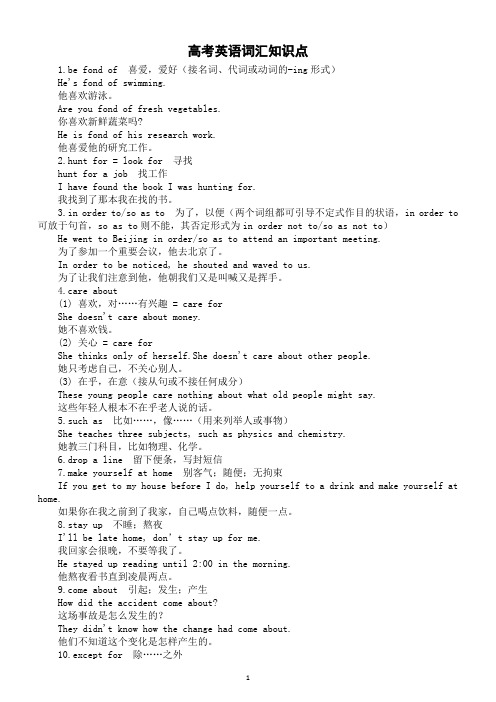
高考英语词汇知识点1.be fond of 喜爱,爱好(接名词、代词或动词的-ing形式)He's fond of swimming.他喜欢游泳。
Are you fond of fresh vegetables.你喜欢新鲜蔬菜吗?He is fond of his research work.他喜爱他的研究工作。
2.hunt for = look for 寻找hunt for a job 找工作I have found the book I was hunting for.我找到了那本我在找的书。
3.in order to/so as to 为了,以便(两个词组都可引导不定式作目的状语,in order to 可放于句首,so as to则不能,其否定形式为in order not to/so as not to)He went to Beijing in order/so as to attend an important meeting.为了参加一个重要会议,他去北京了。
In order to be noticed, he shouted and waved to us.为了让我们注意到他,他朝我们又是叫喊又是挥手。
4.care about(1) 喜欢,对……有兴趣 = care forShe doesn't care about money.她不喜欢钱。
(2) 关心 = care forShe thinks only of herself.She doesn't care about other people.她只考虑自己,不关心别人。
(3) 在乎,在意(接从句或不接任何成分)These young people care nothing about what old people might say.这些年轻人根本不在乎老人说的话。
5.such as 比如……,像……(用来列举人或事物)She teaches three subjects, such as physics and chemistry.她教三门科目,比如物理、化学。
《英语词汇学》知识点归纳-(最新版)

English Lexicology(英语词汇学)Lexicology(词汇学): is a branch of linguistics, inquiring into the origins and meanings of words.The Nature and Scope of English lexicology:English lexicology aims at investigating and studying the morphological structures of English words and word equivalents, their semantic structures, relations, historical development, formation and usages.The subjects that English Lexicology correlated with and extent to:English Lexicology is correlated with such linguistic disciplines as morphology(形态学), semantics(语义学), etymology(词源学),stylistics(文体论)and lexicography(词典学) The reason for a student to study English lexicology:According to the textbook, English Lexicology will definitely be beneficial for students of English.A good knowledge of morphological structures of English words and rules of word-formation will help learners develop their personal vocabulary and consciously increase their word power. The information of the historical development and the principles of classification will give them a deeper understanding of word-meaning and enable them to organize, classify and store words more effectively. The understanding and their sense relations will gradually raise their awareness of meaning and usage, and enable them use words more accurately and appropriately. A working knowledge of dictionaries will improve their skills of using reference books and raise their problem-solving ability and efficiency of individual study.Chapter 1--Basic concepts of words and vocabularyWord(词的定义): A word is a minimal free form of a language that has a given sound and meaning and syntactic function. (1)a minimal free form of a language (2)a sound unity (3)a unit of meaning (4)a form that can function alone in a sentenceSound and meaning(声音与意义): almost arbitrary, “no logical relationship between the sound which stands for a thing or an idea and the actual thing and idea itself”Sound and form(读音和形式):不统一的四个原因(1)the English alphabet was adopted from the Romans,which does not have a separate letter to represent each other (2)the pronunciation has changed more rapidly than spelling over the years (3)some of the difference were creates by the early scribes(4)the borrowings is an important channel of enriching the English vocabularyVocabulary(词汇): all the words in a language make up its vocabularyClassification of English Words:By use frequency:basic word stock&nonbasic vocabularyBy notion:content words&functional wordsBy origin:native words&borrowed wordsThe basic word stock(基本词汇): is the foundation of the vocabulary accumulated over centuries and forms the common core of the language. Though it constitute a small percentage of the EV, it is the most important part of vocabulary.The Fundamental Features of the Basic Word Stock(基本词汇的特征):1)All-National character(全民通用性most important)2)Stability(相对稳定性)3)Productivity(多产性)4)Polysemy(多义性)5)Collocability(可搭配性)没有上述特征的words:(1)Terminology(术语) (2)Jargon(行话)(3)slang(俚语)(4)Argot(暗语)(5)Dialectal words(方言) (6) Archaisms(古语)(7) Neologisms(新词语):Neologisms means newly-created words or expressions, or words that have taken on new meanings.(email)Content words/notional words实词(cloud, run walk, never, five, frequently) and functional words/empty words虚词(on, of, and, be, but)Native Words and Borrowed WordsNative words(本族语词): known as Anglo-Saxon words (50,000-60,000), are words brought to Britain in the 5th century by the Germanic tribes. (mainstream of the basic word-stocks).Two other features:(1)neutral in style (2)frequent in useBorrowed words/Loan words(外来语词): words taken over from foreign languages.(80% of modern EV)4 Types of loan words:1) denizens(同化词): (shirt from skyrta(ON))2) aliens(非同化词/外来词):are borrowed words which have retained their original pronunciation and spelling (kowtow (CH)磕头)3) translation loans(译借词):按其他语言方式组成英语long time no see (from China)4) semantic loans(借义词):they are not borrowed with reference to the form,but their meanings are borrowedChapter 2 the development of the English VocabularyThe Indo-European Language Family(印欧语系)The Eight Groups in Indo-European Family of Languages(8大印欧语群)The Eastern set:(1)The Balto-slavic Group(波罗的-斯拉夫语族):Russian,Bulgarian,Polish,Czech etc.(2)The Indo-Iranian Group(印度-伊朗语族):Hindi,Bengali,Persian etc.(3)The Armenian Group(亚美尼亚语族):Armenian.(4)The Albanian Group(阿尔巴尼亚语族):Albanian.The Western set:(5)The Hellenic Group(古希腊语族):Greek.(6)The Italian Group(意大利语族):Latin ,Romance languages(French,Italian,Spanish, portuguese,Romanian) etc.(7)The Celtic Group(凯尔特语族):Irish,Welsh,Breton etc.(8)The Germanic Group(日耳曼语族):Flemish,German,Dutch,Scandinavian(Norweigian, Swedish,Danish,Icelandic) etc.The Three Stages of Development of the English Vocabulary:1 Old English (450-1100) (vocabulary 50,000 to 60,000):was I high inflected language.2 Middle English (1150-1500):retaines much fewer inflections3 Modern English (1500-up to now): in fact more than 25% of modern E words come almost directly from classical languages. In Modern E, words endings were mostly lost with just a few expections.English has evolved from a synthetic language(Old English) to the present analytic language.Modes of Vocabulary Development(词汇的发展模式):1)creation创造新词:the formation of new words by using the existing materials,namely toots,affixes and other elements.(最重要方式)2)semantic change旧词新义:does not increase the number of word forms but create many more new useages of the words.3) borrowing借用外来词:constitute merely 6 to 7 percent of all new wordsReviving words or obsolete words also contributes to the growth of English vocabulary though quite insignificant.Chapter 3 Word Formation IMorpheme(词素):the smallest functioning unit in the composition of words Allomorph(词素变体): is a different variant form of a morpheme,differ in phonological and spelling form, but at the same in function and meaningType of Morpheme(词素的分类)(1)Free Morphemes(自由词素): have complete meaning in themselves and can be used as free grammatical units in sentences. A free morpheme is one that can stand by itself. (independent).(2)Bound Morpheme(粘着语素): A bound morpheme is one that cannot stand by itself. Bound Morpheme includes two types: (1) bound root(粘附词根) (2)Affix(词缀)Affixes can be put into two groups:1)Inflectional affixes (屈折词缀):affixes attached to the end of words to indicate grammatical relationships are inflectional,thus known as inflectional morphemes.2)Derivational affixes(派生词缀): A) prefix: A prefix comes before words. B)suffix:An adjective suffix(形容词后缀)that is added to the stem, whatever class is belongs to , the result will be an adjective.Free Morpheme =free root(自由词根)Morpheme(词素)Bound root prefixbound derivationalaffix suffixinflectionalRoot and stem(词根和词干)The differences between root and stem:A root is the basic form of a word which cannot be further analyzed without total loss of identity.A stem is the surplus part after the cutting of inflectional morpheme in a word with inflectional morphemes,can be further analyzed, it sometimes could be a root.Chapter 4 Word-Formation II(构词法)1.Affixation词缀法(Derivation派生法):the formation of words by adding word-formaing or derivational affixes to stem.(1)Prefixation(前缀法):It's the formation of new words by adding a prefixes to stems.1)Negative prefixes(否定前缀): un-,non-,in-,dis,a- ,il-,ir-,im-,etc.disobey(not obey)2)Reversative prefixes(逆反前缀): un-,de-,dis- etc. unwrap(open)3) Pejorative prefixes: mis(贬义前缀):mis-,mal-, pseudo- etc.misconduct(bad behaviour)4) Prefixes of degree or size(程度前缀):arch-,extra-,hyper-,macro-,micro-,mini-,out-,over-,sub-,super-,sur-,ultra-,under-,ect. overweight5) Prefixes of orientation and attitude(倾向态度前缀):contra-,counter-,anti-,pro- etc.anti-nuclear6)Locative prefixes(方位前缀):extra-,fore-,inter-,intra-,tele-,trans-, etc. extraordinary(more than ordinary)7) Prefixes of time and order(时间和顺序前缀):fore-,pre-,post-,ex-,re- etc. monorail(one rail)8) Number prefixes(数字前缀):uni-,mono-, bi-,di-, tri-,multi-,poly- ,semi-,etc.bilingual(concerning two languages)9) Miscellaneous prefixes(混杂前缀):auto-, neo-, pan-, vice-.vice-chairman(deputy chairman)(2)Suffixation(后缀法): It's the formation of a new word by adding suffixes to stems.1)noun suffixes 2)adjective suffixes 3)Adverb suffixes 4)verb suffixespounding复合法(also called composition)Compounding: is the formation of new words by joining two or more stemsCompounds are written in three ways: solid连写(airmail),hyphenated带连字符(air-conditioning)and open分开写(air force, air raid)Formation of compounds(复合词的形式)(1)noun compounds :e.g. : air + plane = airplane,flower + pot = flower pot(2)adjective compounds :e.g. acid + head = acid-head(3)verb compounds :e.g. house + keep = housekeep3.Conversion转类法Conversion: is the formation of new words by converting words of one class to another class.(功能转换,又叫零派生.functional shift/zero-derivation)4.Blending拼缀法Blending : is the formation of new words by combining parts of two words or a word plus a part of another word. e.g: motor + hotel = motel, smoke + fog = smog, formula + translation = FORTRAN5.Clipping截短法Clipping:is to shorten a longer word by cutting a part off the original and using what remains instead.e.g. plane from airplane, phone from telephone. 四种形式:1).Front clippings删节前面(phone from telephone)2).Back clippings删节后面(dorm from dormitory)3).Front and back clippings 前后删节(flu from influenza)4).Phrase clippings 短语删节(pop from popular music)6.Acronymy首字母缩写法Acronymy:is the process of forming new words by joining the initial letters of names of social and political organizations or special noun phrases and technical terms.(1)Initialism(首字母缩写词法): initialisms are words pronounced letter by letter. e.g.: BBC(for British Broadcasting corporation)(2)Acronym(首字母拼音法):Acronyms are words formed from initial letters but pronounced as a normal word. E.g.:TEFL(teaching English as a foreign language)7.Back-formation(逆生法,逆构词)Back-formation is considered to be the opposite process of suffixation. It’s the method of creating words by removing the supposed suffixes. (greed from greedy)8.Words From Proper Name(专有名词转成法):Names of people, places, book, and tradenames (e.g.: sir watt siemens(人名) -- watt(瓦特,电功率单位)Chapter 5 Word MeaningThe meanings of “Meaning” (“意义”的意义)Reference(所指):It is the relationship between language and the word. It is the arbitrary and conventional. It is a kind of abstraction, yet with the help of context, it can refer to something specific.Concept(概念):which is beyond language, is the result of human cognition(认识),reflecting the objective world in the human mind.Sense(意义):It denotes the relationship inside the language. ‘The sense of an expression is its place in a system of semantic relationships with other expressions in the language.’Motivation(理据):It accounts for the connection between the linguistic symbol and its meaning.1) Onomatopoeic motivation(拟声理据):words whose sounds suggest their meaning, for these words were creates by imitating the natural sounds or noises. Knowing the sounds of the words means understanding the meaning. E.g.: bang, ping-pong, ha ha. 2)Morphological motivation (形态理据):multi-morphemic words and the meaning of many are the sum total of the morphemes combines. E.g.: airmail, miniskirt .例外:black market, ect.3)Semantic motivation(词义理据):refers to the mental associations suggested by the conceptual meaning of a word. It explains the connection between the literal sense and figurative sense of the word. E.g:the foot of the mountain(foot)4)Etymological motivation (词源理据):the history of the word explains the meaning of the word. E.g:pen-featherTypes of meaning(词义的类别)1.Grammatical Meaning(语法意义):indicates the grammatical concept or relationships (becomes important only in actual context)2.Lexical Meaning (词汇意义)(Lexical meaning and grammatical meaning make up the word-meaning)Lexical meaning has 2 components内容: Conceptual meaning(概念意义) and associative meaning(关联意义)1)Conceptual meaning(概念意义): also known as denotative meaning(外延意义) is the meaning given in the dictionary and forms the core of word-meaning.2)Associative meaning(关联意义):is the secondary meaning supplemented to the conceptual meaning.[4types:(1)Connotative(内涵意义):the overtones or associations suggested by the conceptual meaning, traditionally known as connotations.(例如“母亲”经常与“爱”“关心”“温柔”联系起来)(2)Stylistic(文体意义):many words have stylistic features, which make them appropriate for different contexts.(3)Affective(感情意义):indicates the speaker’s attitude towards the person or thing in question.这种情感价值观分两类:褒义和贬义appreciative & pejorative (4)Collocative(搭配意义):is the part of the word-meaning suggested by the words before or after the word in discussion.]Chapter 6 --Sense relation and semantic field(语义关系和语义场)Polysemy(多义关系)Two approached to polysemy(多义关系的两种研究方法):1.diachronic approach(历时方法) :from the diachronic point of view, polysemy is assumed to be the result of growth and development of the semantic structure of one and same word. First meaning is the primary meaning , the later meanings are called derived meanings.2. synchronic approach (共时方法) : synchronically, polysemy is viewed as the coexistence of various meanings of the same word in a certain historical period of time.基本意义是central meaning , 次要意义是derived meaning.Two processes of development(词义的两种发展类型):1.radiation(辐射型):is a semantic process in which the primary meaning stands atthe centre and the secondary meanings proceed out of it in every direction like rayes.(e.g: face, neck)2.concatenation(连锁型):is the semantic process in which the meaning of a wordmove gradually away from its first sense by successive shifts until there is not a sign of connection between the sense that is finally developed and that which the term had at the beginning.(e.g:treacle)3.In radiation, each of the derived meaning is directly connected to the primarymeaning. In concatenation, each of the later meaning is related only to the preceding one like chains. Though the latest sense can be traced back to the original, there is no direct connection in between.4.They are closely related, being different stages of the development leading topolysemy. Generally, radiation precedes concatenation. In many cases, the two processes work together, complementing each other.Homonymy(同形同音异义关系):words different in meaning but either identical both in sound and spelling or identical only in sound or spelling.Types of homonyms(同音同形异义关系的类别)1)Perfect homonyms(完全同音同形异义词):words identical both in sound and spelling, but different in meaning.2)Homographs(同形异义词):words identical only in spelling, but different in sound and meaning.(最多最常见)3)Homophones(同音异义词):words identical only in sound but different in spelling and meaning.Origins of homonyms (同形同音异义词的来源)1)change in sound and spelling :(eare-ear, lang-long, langian-long)2)borrowing (feria-fair, beallu-ball, baller-ball )3)Shortening(缩略): (ad-advertisement,)The differentiation of Homonyms from Polysemes(同音同形异义词和多义词的区别):1)The fundamental difference : Homonymy refers to different words which happen to share the same form and polysemy are the one and same word which has several distinguishable meanings.2)One important criterion is to see their etymology(词源):Homonymys are from different sources. Polysemant is from the same source.3)The second principle consideration is semantic relatedness(语义关联): The various meanings of polysemant are correlated and connected to one central meaning. Meanings of different homonymys have nothing to do with one another. In dictionaries, a polysemant has its meaning all listed under one headword whereas homonyms are listed as separate entries.Rhetoric features of homonyms(同形同音异义词的修辞特色):As homonyms are identical in sound or spelling, particularly homophones, they are often employed to create puns for desired effect of, say, humor, sarcasm or ridicule.Synonymy (同义关系): one of two or more words in the English language which have the same or very nearly the same essential meaning .Types of Synonymy(同义词的类别) :(1)Absolute synonyms(完全同义词):also known as complete synonyms are wordswhich are identical in meaning in all aspects, i.e. both in grammatical meaning and lexical meaning, including conceptual and associative meanings.[ Absolute synonyms are restricted to highly specialized vocabulary in lexicology. ](2)relative synonyms(相对同义词):also called near-synonyms are similar or nearly thesame in denotation, but embrace different shades of meaning or different degrees ofa given quality.(e.g: change/alter/vary, stagger/reel/totter, strange/odd/queer,idle/lazy/indolent)Sources of synonyms(同义词的来源) :1)Borrowing(借词):最重要的来源(room-chamber, foe-enemy, help-aid, leave-depart, wise-sage, buy-purchase)2)Dialects and regional English (方言和地区英语)3)Figurative and euphemistic use of words (单词的修饰和委婉用法):occupation/profession-walk of life, dreamer--star-gazer, drunk-elevated, lie-distort of fact.4)Coincidence with idiomatic expressions(与习惯表达一致):win-gain the upper hand, decide-make up one’s mind, finish-get through, hesitate-be in two minds, help-lend one a hand.Discrimination of Synonyms(1)difference in denotation外延不同. Synonyms may differ in the range and intensity ofmeaning.(rich-wealthy, work-toil, want-wish-desire)(2)difference in connotation内涵不同. By connotation we mean the stylistic and emotivecolouring of words. Some words share the same denotation but differ in their stylistic appropriateness. (借词:answer-respond, storm-tempest, wood-forest, handy-manual, unlike-dissimilar, homely-domestic, fleshy-carnal.中性词:policeman-constable-bobby-cop, ask-beg-request. 古语词、诗歌:ire/anger, bliss-happiness, forlorn-distresses, dire-dreadful, list-listen, enow-enough, save-expect, mere-lake ) (3)difference in application. Many words are synonymous in meaning but difference inusage in simple terms. They form different collocations and fit into difference sentence patterns. (allow sb. to do sth.- let sb. do sth. / answer the letter-reply to the letter)Antonymy (反义关系) :it is concerned with semantic opposition. Antonyms can be defined as words which are opposite in meaning.Types of Antonyms:1)contradictory terms (矛盾反义词): these antonyms truly represent oppositeness of meaning. 特点:①The assertion of one is the denial of the other. ②Such antonyms are non-gradable. They cannot be used in comparative degrees and do not allow adverbs of intensity like “very” to qualify them . (e.g: single/married)2)contrary terms(对立反义词): antonyms of this type are best viewed in terms of a scale running between two poles or extremes.(e.g: old/young, rich/young, big/small) The two opposites are gradable and one exists in comparison with the other.3)relative terms(关系反义词):this type consists of relational opposites.(parent/child, husband/wife, employee/employer, sell/buy, receive-give)Some of the characteristics of antonyms(反义关系的特点):1)antonyms are classified on the basis of semantic opposition(语义对立)2)a word which has more than one meaning can have more than one antonym3)antonyms differ in semantic inclusion(语义内涵)4)contrary terms are gradable antonyms,differing in degree of intensity, so each has its own corresponding opposite.(hot/warm: hot-cold/warm-cool)The use of antonyms(反义词的使用)1)Antonyms are helpful and valuable in defining the meaning of words.2)To express economically the opposite of a particular thought for the sake of contrast.(e.g :now or never, rain or shine, friend or foe敌友,weal and woe哀乐)3)To form antithesis(对比法) to achieve emphasis by putting contrasting idea together. (proverbs and sayings: easy come , easy go./ more haste, less speed.)Hyponymy(上下义关系): Hyponymy deals with the relationship of semantic inclusion. The meaning of a more specific word is included in that of another more general word. For example, a cat is hyponym of animalSuperordinate and Subordinate (上义词和下义词):use subordinates which are concrete and precise ,presenting a vivid verbal picture before the reader. Superordinates which convey only a general and vague idea.Semantic Field(语义场)Viewing the total meaning in this way is the basis of field theory.e.g.(apple, pear, peach, date, mango, orange, lemon, etc. make up the semantic field of ‘fruits’)The semantic field of the same concept may not have the same members in different language.e.g.(aunt in English, may means “父亲的姐姐,妈妈的姐姐,父亲哥哥的妻子” in Chinese.(122)Chapter 7 Changes in Word Meaning词义的演变Vocabulary is the most unstable element of a language as it is undergoing constant changes both in form and content. Comparatively the content is even more unstable than the form.Types of Changes (词义变化的种类)1.Extension /generalization(词义的扩大): is the name given to the widening of meaning which some words undergo. It is a process by which originally had a specialized meaning has now become generalized.(e.g: manuscript, fabulous, picture, mill, journal, bonfire, butcher, companion)2.Narrowing/ specialization(词义的缩小):is the opposite of widening meaning. It is a process by which a word of wide meaning acquires a narrower or specialized sense.In other words, a word which used to have a more general sense becomes restricted in its application and conveys a special meaning in present-day English.(e.g: deer, corn, garage, liquor, meat, disease, poison, wife, accident, girl). [ when a common word is turned into a proper noun, the meaning is narrowed accordingly. ]3.Elevation /amelioration(词义的升华):refers to the process by which words rise from humble(粗陋的)beginnings to positions of importance. [nice, marshal, constable, angel, knight, earl, governor, fond, minister, chamberlain ]4.Degradation / pejoration(词义的降格):A process whereby words of good origin fall into ill reputation or non-affective words come to used in derogatory(贬损的)sense.[boor, churl, wench, hussy, villain, silly, knave, lewd, criticize, lust ]5.Transfer(词义的转移): Words which were used to designate指明one thing but later changed to mean something else have experienced the process of semantic transfer. Causes of Semantic Change(词义变化的原因)1.Extra-linguistic factors(词义演变的语言外部因素):1) Historical reason(历史原因):Increased scientific knowledge and discovery, objects, institutions, ideas change in the course of time. E.g: pen, car, computer.2 )Class reason(阶级原因):The attitude of classes have also made inroads into lexical meaning in the case of elevation or degradation.3) Psychological reason(心理原因):the associated transfer of meaning and euphemistic use of words are often due to psychological factors. Such slow, humble and despised occupations take more appealing names is all due to psychological reasons.2.Linguistic factors(语言内部原因):the change of meaning may be caused by internal factors with in the language system.1)shorting缩略:gold-gold medal, gas-coal gas, bulb-light bulb, private-private soldier2)borrowing借用:deer-animal-beast3)analogy类推:Chapter 8 Meaning and Context 词义和语境Context in its traditional sense refers to the lexical items that precede or follow a given word. Modern linguists have broadened its scope to include both linguistic and extra-linguistic contexts.Two types of context(语境的种类)1. Extra-linguistic context/ Non-linguistic situation(非语言语境):In a broad sense, context includes the physical situation as well, which embraces the people, time, place, and even the whole cultural background. (look out, weekend, landlord )2.Linguistic context/ grammatical context(语言语境):In a narrow sense, it refers to the words, clauses, sentences in which a word appears. It may cover a paragraph, a whole chapter and even the entire book.分为两类:1) Lexical context(词汇语境):It refers to the word that occurs together with the word in question. (e.g: paper, do)2) Grammatical context(语法语境):It refers the situation when the meaning of a word may be influenced by the structure in which it occurs. (e.g: become)The role of context(语境的作用)1.Elimination of ambiguity(消除歧义)1)Ambiguity due to polysemy or homonymy.2)Grammatical structure can also lead to ambiguity如何消除歧义?——①extend the original sentence ②alter the context a little2.Indication of referents(限定所指)如何限定所指?——①with clear context ②with adequate verbal context3.Provision of clues for inferring word-meaning (提供线索以猜测词义)1)definition2)explanation3)example4)synonymy5)antonymy6)hyponymy(上下义关系)7)relevant details8)word structureChapter 9 English Idioms 英语习语Idioms(习语的定义): are expressions that are not readily understandable from their literal meaning of individual elements. In a broad sense, idiom may include colloquialisms (俗语), Catchphrases(标语),slang expressions (俚语),proverbs(谚语),etc. They form an important part of the English vocabulary.Characteristics of Idioms(英语习语的特点)1.Semantic unity (语意的整体性):words in the idiom they have lost their individual identity. Their meanings are not often recognizable in the meaning of the whole idiom.The semantic unity of idioms is also reflected in the illogical relationship between the literal meaning of each of the idiom.2.Structural stability(结构的稳定性):the structure of an idiom is to a large extent un changeable.1) the constituents of idioms cannot be replaced2) the word order cannot be inverted or changed3) the constituents of idioms cannot be deleted or added to, not even an article.4) many idioms are grammatically unchangeableThe fixity of idiom depends on the idiomaticity.习语性表达习惯Classification of Idioms(英语习语的分类)1. idioms nominal in nature 名词性习语(white elephant累赘物)2 .idioms adjectival in nature形容词性习语(as poor as a church mouse)3 .idioms verbal in nature 动词性习语(look into)4 .idioms adverbial in nature副词性习语(tooth and nail 拼命)5 .sentence idioms 句式习语(never do things by halves)Use of idioms(习语的使用)1.Stylistic features(文体色彩):1)colloquialisms(俗语)2)slang (俚语)3)literary expressions(书面表达)The same idiom may show stylistic differences when it is assigned(指派)different meanings.2.Rhetorical features(修辞色彩)1) phonetic manipulation (语音处理):(1)alliteration头韵法(2)rhyme尾韵法2)lexical manipulation(词法处理)(1)reiteration(duplication of synonyms)同义词并举[scream and shout](2)repetition 重复[out and out](3)juxtaposition (of antonyms) 反义词并置[here and there]3.figures of speech(修辞格)(1)simile明喻(2)metaphor暗喻(3)metonymy换喻/以名词代动作:live by one’s pen(4)synecdoche提喻/以部分代整体:earn one’s bread(5)Personification拟人法(6)Euphemism委婉语:kick the bucket(die)(7)hyperbole 夸张:a world of troubleVariations of idioms(习语的变异形式):1.addition增加2.deletion删除3.replacement替换4.position-shifting位置转移5.dismembering分解Chapter 10 English Dictionaries 英语字典Dictionary: presents in alphabetical order the words of English, with information as to their spelling ,pronunciation, meaning, usage , rules and grammar, and in some, their etymology(语源).Types of dictionaries(词典的种类):1.Monolingual & bilingual dictionaries(单语词典和双语词典):最早的词典都是双语的(1).Monolingual dictionary: is written in one language (LDCE, CCELD). The headword or entries are defined and illustrated in the same language.(2).Bilingual dictionary: involve two languages (A New English-Chinese D, A Chinese-English D)2.Linguistic and Encyclopedic dictionaries(语文词典与百科词典)(1)Linguistic dictionary: aim at defining words and explaining their usages in the language (spelling, pronunciation, meaning, grammatical, function, usage and etymology etc.)可以是单语或是双语的(2)Encyclopedic dictionary:1)encyclopedia (百科全书):is not concerned with the language per se(本身)but provides encyclopedic information. Concerning each headword (not pronunciation, meanings, or usages) but only information.2)Encyclopedic Dictionaries: have the characteristics of both linguistic D and encyclopedia (<Chamber’s Encyclopedic English Dictionary>)3.Unabridged, desk and pocket dictionaries(大型词典、案头词典、袖珍词典)(1)Unabridged D: basic information about a word——its origin, meaning, pronunciation, cognates(同词源的),usage, grammatical, function, spelling, hyphenation,。
英语词汇学知识点归纳总结

英语词汇学知识点归纳总结
1.词汇分类:英语词汇可以分为实词和虚词两大类。
实词包括名词、
动词、形容词和副词,是能独立存在并具有词义的词类;虚词包括冠词、
介词、连词、代词和助词,是不能独立存在或不具有词义的词类。
2.词根与词缀:英语词汇中有很多词根和词缀,词根是词的核心部分,词缀是附加在词根上的,可以改变词的词义、词性或词形。
3.词义:英语词汇的词义可以通过定义、同义词、反义词、上下义词
等方式进行描述和解释。
词义可以有直观意义、引申意义和隐喻意义等。
4.词汇建构:英语词汇的建构可以通过合成、派生、转化、缩略等方
式进行。
合成是通过将两个或多个词根组合成一个新词,派生是通过添加
前缀或后缀来构成新词,转化是通过改变词的词类来构成新词,缩略是通
过省略部分词组或词根来构成新词。
5.词汇变化:英语词汇的变化形式包括时态、语态、人称、数和比较等。
词汇的变化形式可以通过词形变化、语法变化和语义变化等方式进行。
6.外借词:英语词汇中存在大量的外借词,这些词汇主要来自拉丁语、希腊语、法语、德语等其他语言。
外借词在英语中经过适当的拼写、读音
和意义调整后被接受和使用。
7.同源词:英语词汇中存在一些同源词,这些词源于同一词根或词源,并在语音、形态或词义上有一定的相似性。
了解同源词可以帮助理解和记
忆词汇。
8.词汇扩展:英语词汇在发展的过程中会发生扩展,即一个词从最初的特定意义扩展到更广泛的意义。
词汇扩展可以通过引申、转义、隐喻等方式进行。
这些是英语词汇学中的一些主要知识点,通过对这些知识点的学习和理解,可以更好地掌握和应用英语词汇。
高考英语必考词汇知识点

高考英语必考词汇知识点随着中国高考的日益临近,英语作为其中一门必考科目,常常让考生倍感压力。
而英语的语法和词汇知识往往是决定成绩的关键。
本文将介绍高考英语必考的词汇知识点,帮助考生更好地备考。
一、常见词汇短语1.1 名词:在高考中,名词是必然出现的考点。
例如,人名、地名、物品名称等。
考生需要记住一些常见的名词,如"The Great Wall"(长城)、"Beijing"(北京)等。
1.2 动词与动词短语:动词是句子的核心成分,也是英语考试中经常考查的部分。
例如,"study"(学习)、"work"(工作)等。
此外,动词短语也是需要重点记忆的,如 "take part in"(参加)、"come up with"(提出)等。
1.3 形容词与副词:形容词和副词是修饰名词和动词的重要词类。
在高考中,形容词和副词的考察形式多种多样,需要考生根据句子语境作出正确选择,例如,"beautiful"(漂亮的)、"carefully"(小心地)等。
二、同义词与近义词2.1 同义词:同义词是指词义相同或相近的词语。
在高考中,同义词的使用是考察考生词汇掌握能力的重要方式之一。
例如,"happy"(高兴的)和 "glad"(开心的)。
2.2 近义词:近义词是指词义相近但不完全相同的词语。
考生需要注意它们的细微差别,以作准确选词。
例如,"surprised"(惊讶的)和"astonished"(吃惊的)。
三、固定搭配与短语动词3.1 固定搭配:固定搭配是指两个或多个词一起使用,并具有固定的语义。
这些搭配在考试中经常出现,需要考生记忆掌握。
例如,"in the end"(最后)、"by the way"(顺便说)、"on the other hand"(另一方面)等。
英语词汇学知识点整理
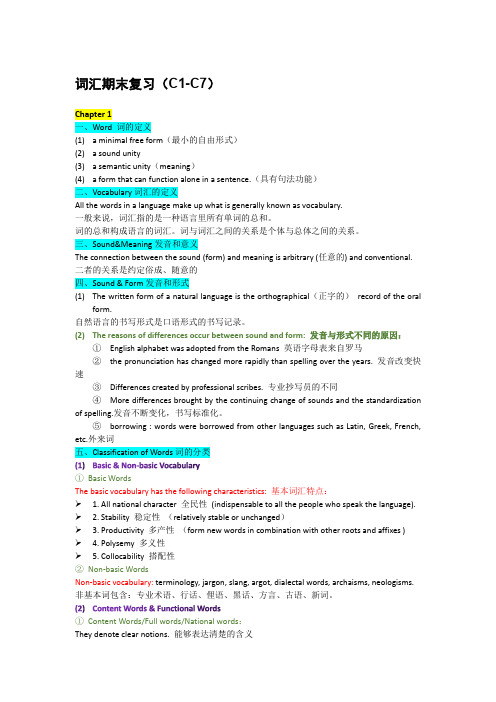
词汇期末复习(C1-C7)Chapter 1一、Word 词的定义(1) a minimal free form(最小的自由形式)(2) a sound unity(3) a semantic unity(meaning)(4) a form that can function alone in a sentence.(具有句法功能)二、Vocabulary词汇的定义All the words in a language make up what is generally known as vocabulary.一般来说,词汇指的是一种语言里所有单词的总和。
词的总和构成语言的词汇。
词与词汇之间的关系是个体与总体之间的关系。
三、Sound&Meaning发音和意义The connection between the sound (form) and meaning is arbitrary (任意的) and conventional. 二者的关系是约定俗成、随意的四、Sound & Form发音和形式(1)The written form of a natural language is the orthographical(正字的)record of the oralform.自然语言的书写形式是口语形式的书写记录。
(2)The reasons of differences occur between sound and form: 发音与形式不同的原因:①English alphabet was adopted from the Romans 英语字母表来自罗马②the pronunciation has changed more rapidly than spelling over the years. 发音改变快速③Differences created by professional scribes. 专业抄写员的不同④More differences brought by the continuing change of sounds and the standardization of spelling.发音不断变化,书写标准化。
五年级英语科普知识基本词汇

五年级英语科普知识基本词汇一、动物类1. Animal - 动物2. Mammal - 哺乳动物3. Reptile - 爬行动物4. Amphibian - 两栖动物5. Bird - 鸟类6. Fish - 鱼类7. Insect - 昆虫8. Herbivore - 食草动物9. Carnivore - 食肉动物10. Omnivore - 杂食动物二、植物类1. Plant - 植物2. Flower - 花3. Tree - 树4. Leaf - 叶子5. Stem - 茎6. Root - 根7. Fruit - 水果8. Seed - 种子9. Photosynthesis - 光合作用10. Pollination - 授粉三、天气类1. Weather - 天气2. Sunny - 晴天3. Cloudy - 多云4. Rainy - 下雨5. Snowy - 下雪6. Windy - 多风的7. Stormy - 暴风雨8. Temperature - 温度9. Humidity - 湿度10. Forecast - 天气预报四、学科类1. Science - 科学2. Mathematics - 数学3. English - 英语4. History - 历史5. Geography - 地理6. Art - 艺术7. Music - 音乐8. Physical Education - 体育9. Chemistry - 化学10. Physics - 物理五、地点类1. School - 学校2. Classroom - 教室3. Library - 图书馆4. Park - 公园5. Zoo - 动物园6. Beach - 海滩7. Museum - 博物馆8. Cinema - 电影院9. Restaurant - 餐厅10. Hospital - 医院六、家庭类1. Family - 家庭2. Father - 父亲3. Mother - 母亲4. Brother - 兄弟5. Sister - 姐妹6. Grandparents - 祖父母7. Uncle - 叔叔8. Aunt - 阿姨9. Cousin - 堂兄弟/堂姐妹10. Pet - 宠物七、食物类1. Food - 食物2. Fruit - 水果3. Vegetable - 蔬菜4. Meat - 肉类5. Rice - 米饭6. Bread - 面包7. Milk - 牛奶8. Water - 水9. Juice - 果汁10. Snack - 小吃以上是五年级英语科普知识基本词汇,掌握这些词汇将有助于扩大英语词汇量,并能更好地理解科学、自然和日常生活中的各种事物。
七年级英语知识点总结词汇
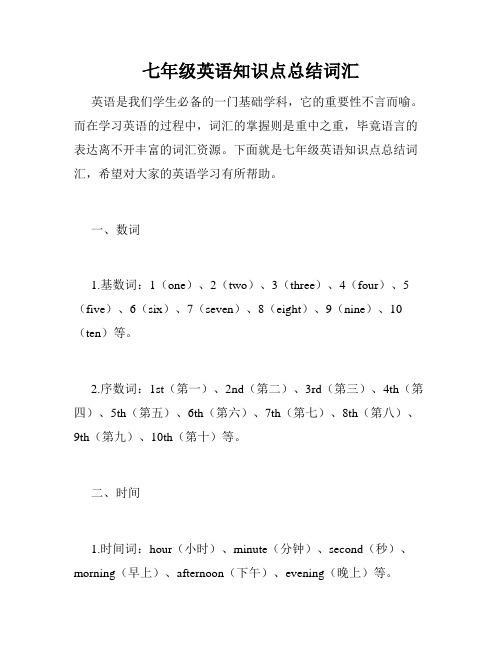
七年级英语知识点总结词汇英语是我们学生必备的一门基础学科,它的重要性不言而喻。
而在学习英语的过程中,词汇的掌握则是重中之重,毕竟语言的表达离不开丰富的词汇资源。
下面就是七年级英语知识点总结词汇,希望对大家的英语学习有所帮助。
一、数词1.基数词:1(one)、2(two)、3(three)、4(four)、5(five)、6(six)、7(seven)、8(eight)、9(nine)、10(ten)等。
2.序数词:1st(第一)、2nd(第二)、3rd(第三)、4th(第四)、5th(第五)、6th(第六)、7th(第七)、8th(第八)、9th(第九)、10th(第十)等。
二、时间1.时间词:hour(小时)、minute(分钟)、second(秒)、morning(早上)、afternoon(下午)、evening(晚上)等。
2.天气词:sunny(晴朗的)、cloudy(多云的)、windy(有风的)、rainy(下雨的)、snowy(下雪的)等。
三、家庭1.家庭成员:father(父亲)、mother(母亲)、son(儿子)、daughter(女儿)、grandfather(祖父)、grandmother(祖母)等。
2.家庭关系:family(家庭)、brother(兄弟)、sister(姐妹)、uncle(叔叔)、aunt(阿姨)、cousin(表兄弟/姐妹)等。
四、学科1.学科名称:math(数学)、English(英语)、Chinese(语文)、history(历史)、geography(地理)等。
2.学科动词:learn(学习)、study(研究)、teach(教育)、review(复习)、practice(练习)等。
五、食物1.水果:apple(苹果)、banana(香蕉)、orange(橙子)、strawberry(草莓)、watermelon(西瓜)等。
2.蔬菜:carrot(胡萝卜)、tomato(番茄)、pepper(青椒)、cucumber(黄瓜)、potato(马铃薯)等。
初中英语词汇知识点归纳
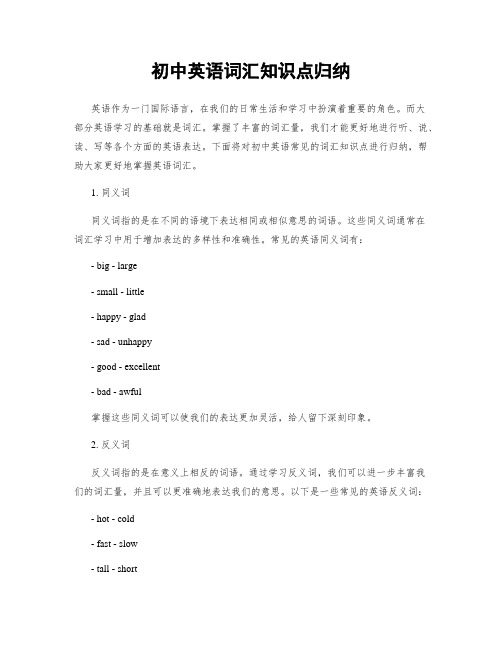
初中英语词汇知识点归纳英语作为一门国际语言,在我们的日常生活和学习中扮演着重要的角色。
而大部分英语学习的基础就是词汇。
掌握了丰富的词汇量,我们才能更好地进行听、说、读、写等各个方面的英语表达。
下面将对初中英语常见的词汇知识点进行归纳,帮助大家更好地掌握英语词汇。
1. 同义词同义词指的是在不同的语境下表达相同或相似意思的词语。
这些同义词通常在词汇学习中用于增加表达的多样性和准确性。
常见的英语同义词有:- big - large- small - little- happy - glad- sad - unhappy- good - excellent- bad - awful掌握这些同义词可以使我们的表达更加灵活,给人留下深刻印象。
2. 反义词反义词指的是在意义上相反的词语。
通过学习反义词,我们可以进一步丰富我们的词汇量,并且可以更准确地表达我们的意思。
以下是一些常见的英语反义词:- hot - cold- fast - slow- tall - short- big - small- long - short- happy - sad掌握这些反义词能够使我们在表达时更加准确地传达我们的意思。
3. 同音异义词同音异义词是指发音相同但意义不同的词语。
学习同音异义词可以帮助我们更好地理解和运用英语,同时避免产生歧义。
下面是一些常见的英语同音异义词:- write - right- bear - bare- to - too - two- for - four- to - two- their - there - they're熟练掌握这些同音异义词可以帮助我们更好地理解和运用英语语言。
4. 固定短语和习惯用语固定短语和习惯用语在英语中非常常见,学会掌握这些短语和习语能够帮助我们更加准确地表达自己的意思。
以下是一些常见的英语固定短语和习惯用语:- How are you? - 你好吗?- Thank you. - 谢谢你。
英语词汇基础知识大全

英语词汇基础知识大全
以下是一些英语词汇的基础知识,可以帮助你提高词汇量和语言表达能力:
前缀:前缀是加在单词前面的词缀,通常会改变单词的意思。
例如,“un-”表示否定,如“unhappy”(不高兴)。
后缀:后缀是加在单词后面的词缀,通常会改变单词的词性。
例如,“-ness”可以加在形容词后面,表示名词,如“happiness”(幸福)。
同义词:同义词是指意思相近的词。
例如,“good”和“excellent”都可以表示“好”。
反义词:反义词是指意思相反的词。
例如,“big”和“small”就是反义词。
词根:词根是构成单词的基础部分。
例如,“act”是“action”(行动)和“actor”(演员)的词根。
动词:动词是表示动作或状态的词。
例如,“run”(跑)、“eat”(吃)。
名词:名词是表示人、物、地点等名称的词。
例如,“person”(人)、“car”(汽车)。
形容词:形容词是用来描述名词或代词特征的词。
例如,“happy”(高兴的)、“beautiful”(美丽的)。
代词:代词是用来代替名词的词。
例如,“she”(她)、“it”(它)。
副词:副词是用来修饰动词、形容词或副词的词。
例如,“quickly”(快速地)、“happily”(快乐地)。
以上是一些英语词汇的基础知识,通过学习和掌握这些基础知识,可以帮助你更好地理解和运用英语词汇,提高你的英语表达能力。
《英语词汇学》知识点归纳
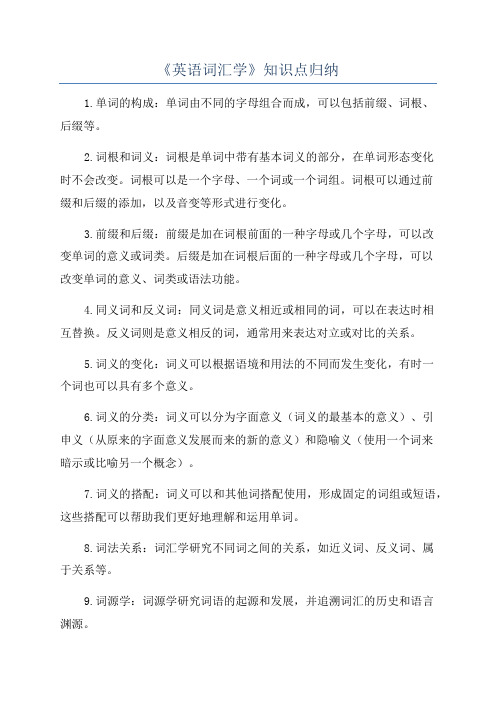
《英语词汇学》知识点归纳
1.单词的构成:单词由不同的字母组合而成,可以包括前缀、词根、
后缀等。
2.词根和词义:词根是单词中带有基本词义的部分,在单词形态变化
时不会改变。
词根可以是一个字母、一个词或一个词组。
词根可以通过前
缀和后缀的添加,以及音变等形式进行变化。
3.前缀和后缀:前缀是加在词根前面的一种字母或几个字母,可以改
变单词的意义或词类。
后缀是加在词根后面的一种字母或几个字母,可以
改变单词的意义、词类或语法功能。
4.同义词和反义词:同义词是意义相近或相同的词,可以在表达时相
互替换。
反义词则是意义相反的词,通常用来表达对立或对比的关系。
5.词义的变化:词义可以根据语境和用法的不同而发生变化,有时一
个词也可以具有多个意义。
6.词义的分类:词义可以分为字面意义(词义的最基本的意义)、引
申义(从原来的字面意义发展而来的新的意义)和隐喻义(使用一个词来
暗示或比喻另一个概念)。
7.词义的搭配:词义可以和其他词搭配使用,形成固定的词组或短语,这些搭配可以帮助我们更好地理解和运用单词。
8.词法关系:词汇学研究不同词之间的关系,如近义词、反义词、属
于关系等。
9.词源学:词源学研究词语的起源和发展,并追溯词汇的历史和语言
渊源。
10.词汇扩充:词汇学研究如何通过学习和运用词汇扩充词汇量,如学习词根、前缀和后缀的意义和用法,以及拆解和分析复杂单词的方法。
英语词汇与语法知识名词详解

英语词汇与语法基础知识英语名词(Noun)可以从形式上进行分类, 英语名词可以划分成专有名词和普通名词两大类。
从意义上划分, 英语名词可分为个体名词、集体名词、物质名词和抽象名词四类。
一般来说, 个体名词可以用数目来计算, 称为可数名词(Countable Nouns)。
物质名词、抽象名词和专有名词无法用数目来计算, 称为不可数名词(Uncountable Nouns)。
集合名词有的可数, 有的不可数。
一、普通名词普通名词指一类人或事物的名称。
英语中普通名词分为可数名词和不可(2)可数名词复数形式的不规则构成法英语中有一部分名词由于历史或词源原因其复数形式的构成法是不规则的。
这种情况主要有:①元音字母变化。
例如:foot-feet man-men . woman-womentooth-teeth goose-geese mouse-mice②结尾为-en。
例如: child-children③单复数同形。
单复数同形的名词主要有: sheep, fish, Chinese, Japanese, deer等。
④只有复数形式。
例如: trousers, goods 等。
(二)可数名词和不可数名词英语中的绝大多数名词既可以用作可数名词也可以用作不可数名词。
1. 可数名词可数名词一般可以分成以下三类:第一类: 如bike, desk, factory等, 这类名词占可数名词的多数。
以bike为例:There are fifty bikes at this shop. 这家商店有50辆自行车。
第二类: 如clothes等, 本身表示复数形式。
以clothes为例:She cares for nice clothes. 她爱好穿着。
2. 不可数名词不可数名词的用法特征主要有以下几种:(1)不带冠词的单数形式需用动词单数作谓语。
例如:Knowledge is power. 知识就是力量。
(2)由much, little等词修饰。
英语词汇知识
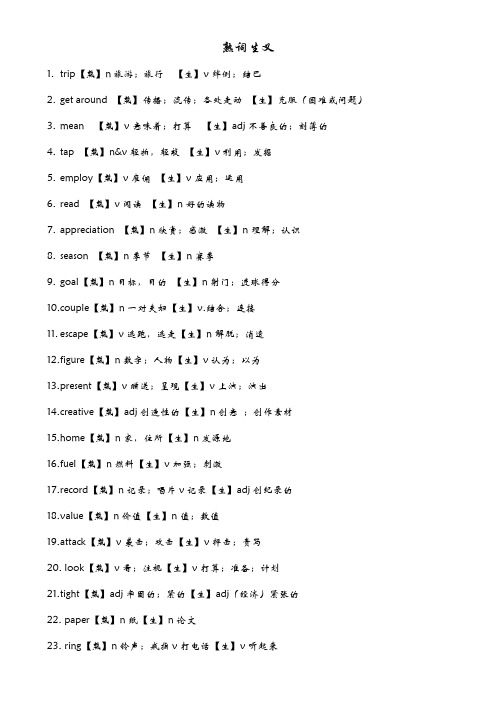
熟词生义1.trip【熟】n旅游;旅行【生】v绊倒;结巴2.get around【熟】传播;流传;各处走动【生】克服(困难或问题)3.mean【熟】v意味着;打算【生】adj不善良的;刻薄的4.tap【熟】n&v轻拍,轻敲【生】v利用;发掘5.employ【熟】v雇佣【生】v应用;运用6.read【熟】v阅读【生】n好的读物7.appreciation【熟】n欣赏;感激【生】n理解;认识8.season【熟】n季节【生】n赛季9.goal【熟】n目标,目的【生】n射门;进球得分10.couple【熟】n一对夫妇【生】v.结合;连接11.escape【熟】v逃跑,逃走【生】n解脱;消遣12.figure【熟】n数字;人物【生】v认为;以为13.present【熟】v赠送;呈现【生】v上演;演出14.creative【熟】adj创造性的【生】n创意;创作素材15.home【熟】n家,住所【生】n发源地16.fuel【熟】n燃料【生】v加强;刺激17.record【熟】n记录;唱片v记录【生】adj创纪录的18.value【熟】n价值【生】n值;数值19.attack【熟】v袭击;攻击【生】v抨击;责骂20.look【熟】v看;注视【生】v打算;准备;计划21.tight【熟】adj牢固的;紧的【生】adj(经济)紧张的22.paper【熟】n纸【生】n论文23.ring【熟】n铃声;戒指v打电话【生】v听起来24.save【熟】v挽救;救助【生】v节省;节约25.key【熟】n钥匙【生】adj主要的;关键的26.jump【熟】v跳跃【生】v猛涨;激增27.feed【熟】v喂养;饲养【生】v把....投入(容器或机器中);满足28.bear【熟】n熊v忍受,容忍【生】v携带29.work【熟】v工作【生】v奏效;起作用30.pick up【熟】捡起;接人【生】参加;挑选;购买31.special【熟】adj特别的【生】n特色菜32.anchor【熟】n锚v抛锚【生】v把...固定33.rest【熟】n&v休息【生】v倚,靠n剩余部分34.production【熟】n生产;产量【生】n演出;推出;作品35.stand up【熟】站起来【生】支持36.dig【熟】v挖掘【生】v刻苦钻研37.deal【熟】v处理n买卖【生】n即将发生的事38.put down【熟】写下,记录【生】付定金39.sit【熟】v坐;使坐下【生】v坐以待毙40.cry【熟】v哭,喊【生】v发出警报41.duty【熟】n责任;义务【生】n作用42.design【熟】v设计【生】v计划;意欲43.average【熟】adj平均的【生】adj普通的44.update【熟】v更新;升级【生】n最近消息45.allow【熟】v允许【生】v使能够46.delicious【熟】adj美味的【生】adj令人愉快的47.Monitor【熟】n班长【生】v监控,监视48.Pack【熟】n包v打包装【生】n一群动物49.address【熟】n地址v写地址【生】v处理50.constant【熟】adj经常的;连续不断的【生】adj恒久不变的;稳定的51.fine【熟】adj好的;健康的;晴朗的【生】v罚款52.life【熟】n生命,生活【生】n活力;热情53.offer【熟】n&v提供,提出【生】n邀请plex【熟】adj复杂的【生】n联合体,综合体地道口语表达1.tiger mother虎妈(对子女严格的母亲)2.Talk shop三句话不离本行3.Dad dancing一种笨拙、过时或放纵的舞蹈形式4.Cough up咳出;勉强说出;被迫付出(描述一个人不情愿)5.Talk the talk说的头头是道6.Out with the old,in with the new辞旧迎新/旧的不去新的不来7.Face the music勇敢地面对困难;接受应得的惩罚8.Fat chance希望渺茫;很少可能(作反语)9.On fire在兴头上;非常激动/表现极佳、攻无不克10.Rat race永无休止的竞争(描述一种生活方式——努力工作、拼命挣钱)11.Hot under the collar怒气冲冲;局促不安12.The joke is on someone开玩笑没成功,反而把玩笑开到了自己头上只能接doing的动词和短语1.建议:suggest:仅供参考的建议recommend:介绍和推荐advise:正式用语,深思熟虑的建议2.坚持:insist on、keep、keep on3.推迟:postpone:表延期put off:表延期,以人作宾语delay:表示推迟日期、耽搁、拖延的含义4.想象:imagine、fancy、dream of5.允许:permit:语气较重,带形式主语it的被动结构allow:语气较轻6.禁止:forbid、prohibit、prevent7.反对:oppose、be opposed to、resist8.放弃:quit:放弃位置、职务;主动give up:放弃习惯;主动、被动9.练习:practice10.避免:avoid11.逃避:escape12.讨论:discuss13.冒险:risk14.主张:advocate15.盼望:look forward to16.继续:carry on17.注意:pay attention to18.忙于:be busy19.着手:get down to、settle down to20.喜欢:enjoy、adore、feel like21.致力:be devoted to、apply oneself to22.习惯:be used to(习惯于+名词/动名词)、be accustomed to23.原谅:excuse、forgive、pardon24.不能容忍:can't tolerate、can't stand 25.完成:finish26.考虑:consider27.讨厌:dislike28.沉迷:be addicted to29.理解:understand30.承认:admit(to)31.错过:miss32.提及:mention33.感谢:appreciate34.包括:include35.突然:burst out36.值得:be worth37.介意:mind38.适应:adjust to只能接to do的动词和短语1.would love to do sth.想要做某事2.desire to do sth渴望做某事2.want to do sth想要做某事3.would like to do sth想要做某事4.long to do sth渴望做某事5.wish to do sth希望做某事6.expect to do sth期待做某事7.hope to do sth希望做某事8.would prefer to do sth宁愿做某事9.be eager to do sth渴望做某事10.offer to do sth主动提出做某事11.claim to do sth声称要做某事12.be anxious to do sth急于做某事13.can't wait to do sth迫不及待地要做某事14.dare to do sth敢做某事15.deserve to do sth值得做某事;应该做某事16.be supposed to do sth应该做某事17.afford to do sth负担得起做某事18.be able to do sth能做某事19.beg to do sth请求做某事20.demand to do sth要求做某事21.ask to do sth要求做某事22.apply to do sth申请做某事23.agree to do sth同意做某事24.decline to do sth拒绝做某事25.refuse to do sth.拒绝做某事26.promise to do sth承诺做某事27.undertake to do sth承诺做某事28.decide to do sth决定做某事29.choose to do sth决定做某事30.determine to do sth下决心做某事31.be determined to do sth下决心做某事32.guarantee to do sth保证做某事33.swear to do sth发誓需要做某事34.take trouble to do sth不辞辛劳做某事35.aim to do sth致力于/旨在做某事36.manage to do sth设法做成某事37.try one's best to do sth尽力做某事38.seek to do sth试图做某事39.attempt to do sth试图做某事40.make an attempt to do sth试图做某事41.struggle to do sth尽力做某事42.spare no effort to do sth不留余力做某事43.make every effort to do sth尽一切努力做某事44.plan to do sth计划做某事45.intend to do sth打算做某事46.prepare to do sth准备做某事47.arrange to do sth安排做某事48.hesitate to do sth犹豫做某事49.bother to do sth费心/麻烦做某事50.happen to do sth碰巧做某事51.fail to do sth没能做某事52.pretend to do sth假装做某事53.learn to do sth学会做某事54.appear to do sth好像做某事55.seem to do sth好像做某事56.be sure to do sth一定会做某事57.tend to do sth倾向于做某事58.be likely to do sth很可能做某事59.help(to)do sth帮助做某事常考重点词语辨析1.指责,控告:accuse:accuse sb of sthCharge:charge sb with sth(用于重大过失)2.年老的:elder:年龄稍长者(用于兄弟姐妹之间)Elderly:常用来代替old3.宣布:declare公开宣布某件事announce首次公开或正式宣布4.活的:alive:生命从奄奄一息到精力旺盛的各种状态live:前置定语,活生生的,现在直播的lively:充满活力的;活泼的5.同意:agree with:同意,赞成(后接“人”或what从句)agree to:一方统一另一方的意见、观点、想法等agree on:双方或多方对某事取得一致意见6.辩论,争论:argue:辩论,争论,着重说理quarrel:争论,争吵,吵架7.到达:arrive:正式的用语+at(小地方)/in(大地方)reach:到达目的地,到底中间站get:口语中常用+to8.问:ask:问:ask sb sth/ask sth of sb请求:ask sb to do sth索取:ask for sth inquire:问,询问,正式用语,调查:inquire into question:提问,质问,审问,怀疑9.熟悉:be familiar with:对...熟悉Be familiar to:对...来说是熟悉的,为...所熟知10.抓住:catch抓住,捉住;赶上车seize用力猛抓;捉拿,逮捕hold握住,手持,抱着catch hold of指抓住某物不放手11.收集:gather:收集,聚集;采摘(宾语:人/物)collect收集,集合(宾语:物)12.相比,比作:compare with把...和...相比compare to把...比作....13.包含:contain包含全部,容纳include包括部分14.花费:cost花费:sth+cost+(sb)+.....spend花费:sb+spend+时间+(in)+v-ing sb+spend+金钱(时间)+on sth take花费时间或金钱:it takes sb+时间/金钱+to do sthpay付款:pay for sth charge收费:charge sb money for sthsell卖:sell sth for money15.治疗,治愈:cure:治愈疾病,后常接介词of treat:治疗+for;对待+as heal:治愈外伤16.死于:die of:由于疾病、饥饿、情感等原因而死亡die from:因某种具体疾病造成的死亡17.discover发现(原来就存在)invent发明(原来不存在)create创造18.打扰:disturb扰乱使无法正常进行interrupt打扰;中断trouble使麻烦19.穿:dress穿衣,穿着put on穿上(衣服),上演,表示动作wear穿着,佩戴,表示状态have on穿,表示状态be in穿,表示状态20.雇用,出租:employ正式用语,指较长期的雇用(宾语:人)hire指短期雇用、租用rent指长时间的租用、出租房屋、场地等21.下落:fall下落,下降drop滴落,掉下22.为生,喂养:feed with喂养feed on靠....为生23.战斗:fight for为争取....而战斗fight against与...战斗;反对...的战争24.寻找,查明:find发现;找到find out查明;查出look for寻找25.忘记,留下:forget忘了带某物leave把某物/某人留在某地remain某人留下来;仍然保持26.发生:happen发生,主语为事occur发生,被想到talk place事先布置或策划好而后发生come about自然产生常见词根1.cept=take拿,取:except除...之外,把...除外accept接受,承认2.cid,cis=cut,kill切,杀:decide决定,判决,下决心concise简明的,简要的的3.agri=field田地,农田:agriculture农业,农艺4.Dict=say言,说:dictate口授命令或指示5.Circ=ring环,圆:circus马戏团circular圆形的,环形的6.Clud=close,shut关闭:exclude排斥,把...排除在外include包含,包住7.Cogn=know知道:recognize认识,认知precognition预见,预知8.Dit=give给:tradition传统,传说edit编辑9.Don=give给:donor赠给者,捐献者10.Duc=lead引导:educate教育11.Fact=do,make作,做:factory工厂,制造厂12.Flu=flow流:influence影响,感动13.Fer=bring,carry带,拿:differ不同14.Gress=go,walk行走:progress前进,进步15.Ject=throw投掷:object反对,抗议16.Lect=choose选:select挑选,选出17.Log=speak言,说:dialogue对话logic逻辑18.Medi=middle中间:immediate立刻的,直接的medium中间,中间物,媒介19.Merg=dip,sink沉,没:submerge沉下,沉于水中20.Pel=push,drive推,驱:propel推进,推动21.Port=carry带,拿,运:import输入,进口export输出,出口22.Pos=put放置:exposure揭露,暴露23.Rect=right正确:correct改正,纠正24.Sect=cut切割:section部分,部门25.Spect=look看:respect尊重,尊敬前缀和后缀一.常用前缀Dis-不,没有:disable残疾的dislike讨厌Im-不:impossible不可能的immoral不道德的In-不,向内:informal非正式的inhuman不人道的re-回,重新:review复习redo重做Un-不,非:unhappy不快乐的unimportant不重要的二.常用后缀-ment行为:enjoyment娱乐development发展-ness性质,状态:illness疾病correctness改正-able可能的:movable可移动的respectable可敬的-er人,物:teacher老师cooker厨具-or人,物:actor男演员visitor参观者-ist人:pianist钢琴家scientist科学家-less没有的:hopeless没有希望的homeless无家可归的-ful充满:beautiful美丽的useful有用的三.动词后缀-ify转为,变为:beautify美化diversity多样化simplify简单化-ize/-en使...怎么样,变得....:modernize现代化popularize流行化widen加宽threaten使受到威胁-ate增加,使...:originate起源于hydrogenate氢化validate使合法化differentiate使有区别四.名词后缀-let小或者不重要的东西:booklet小册子leaflet小叶子starlet小明星-ette小的东西;假的东西:cigarette香烟leatherette假皮革-ess女性:actress女演员poetess女诗人hostess女主人paintress女画家-hood时期:boyhood儿童时期childhood童年时期manhood男子气概-ship才能,状态,资格,品质:leadership领导friendship友谊Membership会员lectureship讲座-ful量:cupful一杯handful一把mouthful一口spoonful一勺-tion状态;机构:action动作,行动oppression压迫organization组织foundation建立基地-ment状态;行动:movement enslavement pavement-al动作:arrival到达refusal拒绝revival复活removal移动-age程度;数量:wastage浪费coverage覆盖acreage shrinkage-ness/-ity状态;品质:happiness usefulness rapidity activity-ism道义,主义:idealism racism五.形容词后缀-ly有...品质的:beastly manly brotherly friendly-able能...的;可以...的:changeable readable drinkable comfortable-y/-ish像...一般的:sandy silky foolish girlish-ed有...的:wooded pointed moneyed odd-shaped-al有...属性的,...类型的:cultural personal regional musical-ous有...品质的;像...的:glorious erroneous malicious gracious-ic(al)像...一般的:historic historical methodical dramatic-ive有...属性的;有某种倾向的:attractive talkative restrictive defensive 六.副词后缀-ly以...方式的:happily boldly attentively strangely-ward方式或动作的方向:onward backward earthward homeward-wise按照...方式;就...而言:crabwise clockwise。
词汇知识 英语

词汇知识英语
由于您没有给出具体的词汇内容,我可以给您一个关于整理英语词汇知识学习资料(按照发音和词性)的模板示例,假设以人教版初中一年级上册的部分词汇为例:
一、名词(n.)
1. book.
- 发音:[bʊk]
- 词义:书。
- 例句:I have a book.
2. pencil.
- 发音:[ˈpensl]
- 词义:铅笔。
- 例句:This is my pencil.
3. ruler.
- 发音:[ˈruːlə(r)]
- 词义:尺子。
- 例句:The ruler is long.
二、动词(v.)
1. run.
- 发音:[rʌn]
- 词义:跑。
- 例句:He can run fast.
2. write.
- 发音:[raɪt]
- 词义:写。
- 例句:I can write my name.
3. read.
- 发音:[riːd]
- 词义:读。
- 例句:She likes to read books.
三、形容词(adj.)
1. big.
- 发音:[bɪɡ]
- 词义:大的。
- 例句:The elephant is big.
2. small.
- 发音:[smɔːl]
- 词义:小的。
- 例句:The cat is small.
3. tall.
- 发音:[tɔːl]
- 词义:高的。
- 例句:He is a tall boy.。
英语 词汇基础知识
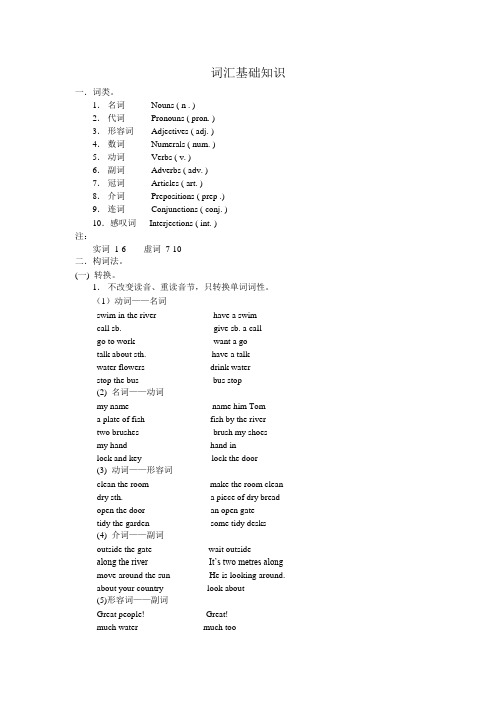
词汇基础知识一.词类。
1.名词Nouns ( n . )2.代词Pronouns ( pron. )3.形容词Adjectives ( adj. )4.数词Numerals ( num. )5.动词Verbs ( v. )6.副词Adverbs ( adv. )7.冠词Articles ( art. )8.介词Prepositions ( prep .)9.连词Conjunctions ( conj. )10.感叹词Interjections ( int. )注:实词1-6 虚词7-10二.构词法。
(一) 转换。
1.不改变读音、重读音节,只转换单词词性。
(1)动词——名词swim in the river have a swimcall sb. give sb. a callgo to work want a gotalk about sth. have a talkwater flowers drink waterstop the bus bus stop(2) 名词——动词my name name him Toma plate of fish fish by the rivertwo brushes brush my shoesmy hand hand inlock and key lock the door(3) 动词——形容词clean the room make the room cleandry sth. a piece of dry breadopen the door an open gatetidy the garden some tidy desks(4) 介词——副词outside the gate wait outsidealong the river It’s two metres alongmove around the sun He is looking around.about your country look about(5)形容词——副词Great people! Great!much water much tooI’m well. I study well.Exercise 判断下列各句中划线部分词性并译成汉语。
2024-2025年高考英语短句词汇记背知识点
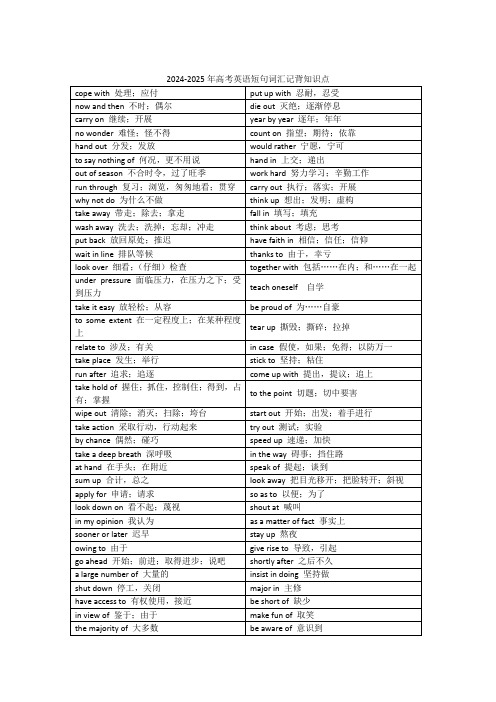
lie in睡懒觉;在于;位于
cut off切断;断绝;砍掉
save up储存;贮存;节省
reply to回答;回复
let alone更不用说
dress up盛装打扮;装饰
run after追赶;跟踪
refer to涉及;指的是;提及;适用于;参考
cut off切断;断绝;砍掉
2024-2025年高考英语短句词汇记背知识点
cope with处理;应付
put up with忍耐,忍受
now and then不时;偶尔
die out灭绝;逐渐停息
carry on继续;开展
year by year逐年;年年
no wonder难怪;怪不得
count on指望;期待;依靠
hand out分发;发放
favoured college中意的大学
figure out想出,理解
come about发生;产生
think over仔细考虑
take priority over优先于,比……重要
set a good example for sb.给某人树立好榜样
by all means尽一切办法,一定,务必
recover from恢复健康
go close to接近
all of a sudden突然
last but not least最后但同样重要的是
by nature天生,生就
pass away过世,去世
at that instant在那时
as a consequence结果
on offer正在出售;降价出售
find out topic找出话题
be fond of喜欢
英语相关知识、词汇积累

词汇积累1. With my own ears I clearly heard the heart beat of the nuclear bomb.我亲耳清楚地听到原子弹的心脏的跳动。
2. Next year the bearded bear will bear a dear baby in the rear.明年,长胡子的熊将在后方产一头可爱的小崽。
3. Early I searched through the earth for earthenware so as to research in earthquake.早先我在泥土中搜寻陶器以研究地震。
4. I learn that learned earnest men earn much by learning.我得知有学问而认真的人靠学问挣很多钱。
5. She swears to wear the pearls that appear to be pears.她发誓要戴那些看起来像梨子的珍珠。
6. I nearly fear to tear the tearful girl's test paper.我几乎害怕撕那个泪流满面的女孩的试卷。
7. The bold folk fold up the gold and hold it in hand.大胆的人们将黄金折叠起来拿在手里。
8. The customers are accustomed to the disgusting custom.顾客们习惯了令人讨厌的风俗。
9. The dust in the industrial zone frustrated the industrious man.工业区里的灰尘使勤勉的人灰心。
10. The just budget judge just justifies the adjustment of justice.公正的预算法官只不过为司法调整辩护而已。
最新-英语知识分类词汇(全)英语语法手册(全) 精品

分类词汇1. People1. baby 婴儿2. being 物;生物;人3. child (复children) n. 孩子,儿童4. citizen 公民,居民,市民5. civil 国内,平民(非军人)的;民用6. companion 同伴,同事7. comrade n. 同志8. crowd n..人群vt. 拥挤,群聚9. enemy n. 敌人;敌军10. fellow n. 同伴;伙伴11. friend [frend] n. 朋友12. generation n.代,一代13. guest n. 客人,宾客14. human a.&n. 人,人类15. human being 人16. man (单数,无冠词)n.人,人类(包括男女)17. neighbour (-bor) n.邻居,邻人18. partner n. 搭档,股东,舞伴19. people n. 人,人们;人民20. person n. 人, 身体, 容貌,21. population n. 人口22. public a.公共的,公众n.公众23. race [reis] n. 种族,民族24. teenager (13-19)青少年25. adult26. kid2. Sex1. boy n. 男孩2. female a. 女性的;雌性的3. girl n. 女孩4. gentleman n. 绅士,先生5. lady n. 女士,夫人6. sex [seks] n. 性,性别,7. madam/madame夫人,女士8. male [meil] a. 男的, 雄的, 男9. man (men) n.男人,成年男子10. Mr. (mister) n.先生, 阁下11. Mrs.(mistress) 夫人, 太太12. Ms. [miz] n. 女士, 小姐13. sir n. 先生;阁下14. woman n. 妇女,女人,女仆3. Body1. arm n. 臂, 支架2. back 向后a. 后面的n. 背3. bath n. 洗澡;浴室;澡盆4. beard n. (下巴处的)胡须5. body n. 身体6. body building n. 健美7. bone n. 骨头,骨质8. blood n. 血,血液9. brain [brein] n. 脑(子)10. cheek n. 面颊,脸蛋11. chest n. 箱子;盒子;胸部12. ear n. 耳朵,耳状物;听力,13. eye [ai] n. 眼睛14. face [feis] n. 脸vt. 面向;15. facial a. 面部用的16. finger n. 手指17. fingernail n. 指甲18. flesh n. 肉19. fist [fist] n. 拳(头)20. foot [fut] (复feet) 足,脚;英尺21. hand n. 手;指针v. 递;给,22. handful n.(一)把;少数,少量23. hair n. 头发24. head [hed] n. 头,标题a. 头部25. heart n. 心,心脏,精神,26. knee [ni:] n. 膝盖27. leg [leg] n. 腿;腿脚;支柱28. lip [lip] n. 嘴唇, 唇缘29. lung n. 肺;肺脏, 呼吸器30. moustache n. 小胡子(嘴唇上方)31. mouth n. 嘴,口32. mouthful n. 满口,一口33. neck [nek] n. 颈,脖子34. nose n. 鼻, v.侦察出35. pulse n. 脉搏,脉动,搏动36. shoulder n. 肩膀;侧翼37. stomach n. 胃,胃部38. temperature n. 温度39. tongue n. 舌头, 语言, 口40. tooth (teeth) n. 牙齿41. throat n. 喉咙, 嗓音, 窄路42. waist [weist] n. 腰,腰部4.Time1. month n. 月,月份2. January n. 1月3. February n. 2月4. March n. 3月5. April . 4月6. May 5月7. June n . 6月8. July] n. 7月9. August 8月10. September n. 9月11. October . 10月12. November n. 11月13. December n. 12月14. week 星期,周15. Sunday n. 星期日16. Monday 星期一17. Tuesday 星期二18. Wednesday n. 星期三19. Thursday n. 星期四20. Friday 星期五21. Saturday 星期六22. fortnight 十四日,两星期23. season . 季;季节24. spring .春天,春季25. summer 夏天,夏季26. autumn 秋天,秋季27. winter 冬天,冬季,萧条期28. dawn n. 黎明,拂晓29. morning 早晨,上午30. evening 傍晚,晚上31. midday 中午, 正午32. noon 中午,正午33. day 天,日;白天34. night . 夜;夜间35. tonight 今晚,今夜36. today . 今天,现在,当前37. now 现在, 目前, 此刻38. yesterday . 昨天39. tomorrow 明天, 未来40. everyday .每日的,日常的41. time 时间次数vt. 计时, 定时42. year n. 年, 年龄, 年岁43. century n. 世纪,百年44. daily 每日的每天n. 日报45. date 日期;约会, 枣46. former 以前的, 前者47. future 将来48. hour 小时, 钟头,课时49. minute 分钟,一会儿,瞬间50. modern 现代的, 时髦的51. once 一次, 从前conj. 一旦52. past 过n. 过去,走过某处53. period 时期,时代,学时54. second 秒, 次货, 二等品55. stage n. 舞台;阶段56. age 年龄;时代5.Colour1. black 黑色a. 黑色的2. blue [blu:] n. 蓝色a.蓝色的3. bright 明亮的;聪明的4. brown 褐色,棕色, 褐色的5. colour (color) n. 颜色vt.涂色6. dark 黑暗,日暮暗淡的;深色的7. darkness 黑暗,阴暗8. flame [fleim] n. 火焰,光辉9. flaming a. 火红的;火焰般的10. green 绿色的,青的n.绿色11. greengrocer (英) 蔬菜水果商12. grey / gray 灰色的;灰白的13. light 明亮的,轻的,浅色14. pale . 苍白的,灰白的15. pink 粉红色的, 石竹花16. red 红色 a.红色的17. shine 发光,照耀,杰出,擦亮18. white 白色的n. 白色19. yellow 黄色的6.Animal1. animal n. 动物2. ant n. 蚂蚁3. bat n. 蝙蝠4. bear n. 熊5. beast [bi:st] n. 野兽;牲畜6. bee .. 蜜蜂7. beef [bi:f] n. 牛肉8. bird n. 鸟,禽类9. bull [bul] n. 公牛10. buttrfly11. camel n. 骆驼12. cat n. 猫13. cattle n. 牛(总称),家畜14. chicken n. 鸡;鸡肉15. cock n. 公鸡, 头目v. 翘起16. cow 母牛,奶牛17. deer n. (单复数相同)鹿18. dog n. 狗19. duck n. 鸭子20. egg n. 蛋;卵21. elephant n. 象22. fish 鱼;鱼肉vi. 钓鱼;捕鱼23. fox n. 狐狸24. frog n. 青蛙25. fly [flai] n. 飞行;苍蝇26. goat n. 山羊27. goose (复geese) n. 鹅28. hawk n. 鹰, 鹰派成员29. hen [hen] n. 母鸡30. horse n. 马vi. 骑马31. kangaroo n. 大袋鼠32. lamb n. 羔羊33. lion n. 狮子34. meat (猪、牛、羊等的)肉35. monkey n. 猴子36. mouse (mice) n.鼠,耗子,鼠标37. mutton n. 羊肉38. nest 巢;窝39. ox (复oxen) n. 牛;公牛40. panda n. 熊猫41. parrot n. 鹦鹉vt. 学舌42. pest . 害虫43. pet 宠物,爱畜, 宠爱44. pig n. 猪, 猪肉, 贪婪的人45. pork n. 猪肉46. rabbit . 兔,家兔47. rat 大老鼠48. seal 海豹n.&v.封铅,封条,印49. sheep 羊, 绵羊, 羞答答的人50. skin 皮,皮肤;兽皮51. snake 蛇v. 蛇般爬行52. sparrow n. 麻雀53. squirrel n. 松鼠54. tail 尾部, 尾巴, , 后部55. tiger 老虎, 虎, 凶暴的人56. trunk 象鼻57. whale [weil, hw-] n. 鲸58. wing 机翼,翅膀59. wolf 狼, 残忍贪婪之人60. worm 软体虫,蠕虫7.Plant1. bamboo n. 竹2. branch 树枝, 分店,支部3. bush 灌木丛,矮树丛4. flower 花5. forest n. 森林6. grass 草;草场;牧草7. hay 作饲料用的干草8. leaf (复leaves)(树,菜)叶9. pine 松树, 树木v.消瘦, 憔悴10. plant 植物11. root 根,根源,起源12. rose n. 玫瑰花, 玫瑰红13. seed [si:d] n. 种子14. shade 阴凉处,树荫处,黑暗15. shadow . 影子,阴影,庇护16. tree 树, 木料, 树状物17. trunk 干线, 树干, 躯干, 箱子18. weed . 杂草,野草19. wood 木头, 木材, 树木20. wooden a. 木制的8.Nature1. bank n.(河、海、湖)岸,堤2. bay 湾;海湾3. beach n. 海滨,海滩4. canal n. 运河;水道5. cave . 洞,穴;地窖6. channel n.频道;通道;水渠7. coast n. 海岸;海滨8. desert n. 沙漠9. disaster n. 灾难;祸患10. fire n. 火/灾vi. 开火,解雇11. fireplace n. 壁炉12. firewood n. 木柴13. fireworks n. 焰火14. flood n.洪水vt. 淹没,使泛滥15. fountain n. 喷泉16. freeze 结冰17. freezing a. 冻结的;极冷的18. hill 小山;丘陵;土堆19. hole n. 洞,坑20. hurricane n. 飓风, 狂风21. ice 冰冻, 冰冻食22. lake 湖23. moon 月球, 月亮, 卫星24. mountain(s) n. 山,山脉25. mountainous a.多山的26. mud n. 泥, 泥浆27. nature n. 自然, 性质,种类28. natural a.自然的, 天生的29. ocean n. 海洋, 许多, 广阔30. Oceania n. 大洋洲31. orbit 轨道,生活常规,眼眶32. plain 家常,普通n.平原, 草原33. planet n. 行星34. pool 水塘,水池, 撞球, 联营35. prairie n. 大草原, 牧场36. river n. 江;河;水道;巨流37. rock n.&v. 岩石,暗礁,石头38. sand n. 沙, 沙子,沙滩, 沙地39. sea 海洋, 大浪, 大量, 许多40. seashell n. 海贝41. seaside n.&a. 海滨, 海边42. shore n. 滨,岸43. spring n. 泉水, 泉44. star n. 星, 恒星, 明星, 名角45. steam [sti:m] n.&v. 汽,水蒸气46. stone n. 石头,石料47. strait [streit] n. 海峡48. stream [stri:m] n. 小河;溪流49. sun n. 太阳,阳光50. sunburnt a. 晒黑的51. sunglasses n. 太阳眼镜,墨镜52. sunlight n. 日光, 阳光, 日照53. sunny 晴朗的;阳光充足的54. sunrise n. 日出,拂晓55. sunset n. 日落, 晚年56. sunshine n. 阳光57. valley n. 山谷, 溪谷58. water n.水,雨水,海水v.浇水59. wave波浪, 示意v. 挥手挥动60. well n. 井9.Universe1. abroad ad. 到(在)国外2. air n. 空气;大气3. earth n. 地球;土,泥;大地4. earthquake n. 地震5. field 田地;牧场;场地6. foreign a. 外国的7. foreigner n. 外国人8. globe n. 地球仪;地球9. ground n. 地面,土地,战场10. heaven n. 天,天空, 天堂11. international a国际的12. land n. 陆地;土地v. 登岸(陆);降落13. room [ru:m]n.空间,地方,余地14. sky [skai] n. 天;天空15. skyscraper n. 摩天楼16. soil 土壤,土地, 国土, 温床17. space 空间, 间隔, 空地18. spaceship n. 宇宙飞船19. universe n.宇宙, 世界20. world n.世界,世事,世故,社会world-famous a. 世界闻名的worldwide a. 遍及全球的10.Country1. continent大陆,大洲,陆地2. country n.国家,农村,乡下3. nation n. 民族,国家4. national a.国家的,民族的5. nationality n.国籍6. republic n.&a共和国,共和7. state 国家,州,政府8. Africa n. 非洲9. African a.非洲(人)的,非洲人10. America n. 美国;美洲11. American 美国(人)的,美国人12. Antarctic a. 南极的13. Antarctica n. 南极洲14. Arab a. 阿拉伯的阿拉伯人15. the Arctic 北极16. Asia n. 亚洲17. Asian a. 亚洲(人)的n. 亚洲人18. the Atlantic Ocean大西洋19. Australia n.澳洲,澳大利亚20. Australian n. 澳大利亚人21. Britain n. 英国;不列颠22. British大不列颠的;英国(人)的23. the British n. 大不列颠人24. Canada n. 加拿大25. Canadian a.加拿大(人)的26. China n. 中国, 瓷器27. Chinese a.中国(人)的;汉语的28. England n.英格兰29. English a. 英国的/人的,英语30. English-speaking a. 说英语的31. Europe n. 欧洲32. European 欧洲人33. France n. 法国34. French 法语a法国的/人的35. Frenchman (-men)法国人(男)36. German a. 德国(人)德语的37. Germany n. 德国38. Greece n. 希腊39. Greek 希腊,希腊语40. Iceland n. 冰岛41. Ireland n. 爱尔兰42. Italian a. 意大利(人)/语的43. Italy n. 意大利44. Japan n. 日本45. Japanese n.日本人,日语46. London n. 伦敦47. Mexican a.墨西哥的/人48. Mexico n. 墨西哥49. New York n. 纽约50. New Zealand 新西兰51. Ottawa n. 渥太华52. the Pacific Ocean n. 太平洋53. Paris n. 巴黎54. Russia n. 俄罗斯,俄国55. Russian a. 俄国人(的),俄语56. Scotland n. 苏格兰57. Spain 西班牙58. Spanish ] n. 西班牙语59. Swiss 瑞士人的n. 瑞士人60. Switzerland n. 瑞士11.Street1. address n. 地址2. area n.面积,地方,范围,领域3. avenue n. 大道4. block vt. 阻塞;阻挡5. n. 大块;块;街区;路障6. city n. 市,城市,都市7. district n. 区,地区,区域8. passage n.通过,经过,通道9. pass 传,递;经过. 通行证10. passenger n. 乘客,旅客11. passer-by n. 过客,过路人12. path n. 小道,小径13. place 地方v. 放置安置,职位,14. position n.位置,职位,立场15. province n. 省16. rail 铁轨, 横杆, 围栏, 扶手17. railway 铁路;铁道18. region n区域, 地方, 领域19. road n. 路,道路20. route 路;路线;航线21. spot n. 斑点,地点v. 沾污,弄脏22. street 街,街道23. town 城镇,城24. village n. 村庄,乡村25. villager n. 村民26. way 路,路线,方式,手段27. zone n. 区域;范围12.direction1. afterwards 后来2. backward(s) 向后3. eastwards . 向东4. northwards 向北5. westwards 向西6. east 东方的, 朝东的7. eastern 东方的;东部的8. northern 北方的,北部的9. northwest 西北10. north 北;朝北,北部11. northeast 东北(部)12. middle .中间;当中;中级的13. south 南, 南方, 南风14. southeast 东南15. southern 南部的,南方的16. southwest 西南17. west 西方, 西部18. western 西方的,西部的19. westerner n. 西方人20. ahead 在前,向前21. around 在周围,在附近22. border 边缘,边境,国界23. bottom 底部;底24. central 中心的,中央;主要的25. centre (美center ) 中心,中央26. corner . 角;角落;拐角27. direction 方向;方位28. distance 距离29. distant 远的,遥远的30. edge 边缘31. far远的;远地(farther,farthest,further,furthest)32. Forward 将来,今后,向前33. front 前面的;前部的34. frontier 前沿,边界,前线35. head (朝某方向)前进36. left 左边ad. 向左n. 左(边)37. left-handed a. 惯用左手的38. right 右边ad. 正确地,恰恰,完全地39. top 顶部,顶端,极点,顶蓬40. widespread a. 分布广;普遍的13.表示方位或时间的介词1. ago 以前2. after 在后;后来.3. before 在…前/前面4. during 在…期间/过程中5. from prep. 从;从…起;来自6. next .最近,隔壁;下一次7. since 自从,后来8. then 当时,那时;然后;那9. throughout 遍及,贯穿, 始终,10. till 直到,…为止11. until .直到…为止12. about 大约;到处,关于;在13. above 在…上面,上面的14. among在(三个以上)之间15. aside 在旁边16. at 在(几点), 在(某处)17. behind在后面,向后(位置)18. below 在……下面19. beneath 在…下方(面)20. beside prep. 在……旁边;靠近21. between (两)之间;22. beyond (位置)在…那边23. by 靠近,在…旁;在…时间24. close 亲密的;近,靠近25. ad. 近,靠近26. down 沿着,沿…而下, 向下27. downstairs ad. 在楼下;到楼下28. downward 向下29. in 在…里(内);在…以…30. into 到…里,向内,变成31. near 近的ad. 附近,邻近32. prep. 在……附近,靠近33. on 在…上(时),关于34. over 在…上方,越过,遍及35. ad. 翻倒;遍布;越过;结束36. out 出外;在外,向外;熄37. outdoors 在户外,在野外38. outer 外部的,外面的39. outside 外面ad. 在外面40. outward(s) 向外的,外出41. side 边,旁边,面,侧面42. to 向, 往, 给..., 比43. toward(s) 向,朝,对于44. under 在/ 向…下面45. up 向上, 到(较高的地方46. upper 较高的,较上的47. upstairs 在楼上,到楼上48. upward(s) 向上;往上14.Sense1. gaze v. 凝视,注视2. glance vi. 匆匆一看;一瞥3. glare v. 瞪眼/怒目而视;闪耀4. hear v. 听见;听说, 得知5. hearing n. 听力6. listen vi. 听, 听从, 收听7. look 脸色v. 看, 看起来8. observe v. 观察,监视,观测9. stare vi. 盯,凝视10. see 看见,看到;领会;拜会11. sight 情景,风景;视力, 视域12. sightseeing n. 游览,观光13. sense n.&v 感觉,意识, 认识14. sensible a.有感觉,明智的15. sensitive a.敏感的,灵敏的16. smell n.气味v.嗅,闻到,发气味17. smelly a. 有臭味的,发臭的18. taste n. 味道vt.体验,感到19. tasteless a. 无滋味的20. tasty a. 好吃的, 可口的21. touch 触, 触觉, 接触,22. view n. 看法,见解;风景,23. viewer 观看者,观众,阅读器24. watch vt. 观看当心n. 手表15.Attraction1. act 法令,条例v. 表演,2. 扮演,演出;行动,做事3. action n. 行动4. active a. 积极的,主动的5. activity n. 活动6. amaze v 惊奇,惊叹;震惊7. astonish vt. 使惊讶8. attract v. 吸引,引起9. attractive 迷人的,有吸引力的10. busy a. 忙(碌)的11. fact n. 事实,现实12. free 自由的,空闲的;免费的13. freedom n. 自由14. freeway n. 高速公路15. fun . 有趣的事,娱乐,玩笑16. funny 有趣的,滑稽可笑的17. gentle 温柔的,轻轻的18. gesture n. 姿势,手势19. humorous a.幽默,诙谐20. humour (humor) n.幽默21. hurry vi. 赶快;急忙22. interest n. 兴趣,趣味,利息23. interesting a. 有趣的24. joke n. 笑话25. manner n. 方式,态度,举止26. noble a. 高贵的,贵族的27. polite a.有礼貌的,有教养的28. rough a.& ad. 粗糙的,粗暴的29. rude 无理的,粗鲁的,残暴的30. savage 野蛮人,未开化的人31. surprise n.&v. 惊奇,诧异32. wild 未开发的/荒凉的/野生的33. wildlife n. 野生动物16.catch1. catch v.接住,捉住,赶,染上病2. grasp v. 抓住;紧握3. hold vt.拿,抱,握住,举行,进行4. seize vt. 抓住, 逮住, 夺取5. snatch n.&v. 夺,夺得,夺走6. drive v. 驾,开,驱赶7. driver's license(美) 驾驶执照a) driving licence(英)8. hunt 寻找;狩猎,猎取9. hunter n. 猎人10. follow vt.跟随,仿效,跟得上11. following a. 接着的;以下的17.Push1. close vt. 关,关闭2. drag v. 拖;拽3. draw v.拉,拖,提取(金钱)4. drawer n. 抽屉5. fold vt. 折叠;合拢6. open a. 开着,开口vt.打开7. pull 拉,拖n. 拉力,引力8. push 推,推动,奋发,干劲9. shut v. n.关,封闭,禁闭18.Action1. bathe 洗澡;游泳2. bite v. 咬;叮3. breath n. 气息;呼吸4. breathe vi. 呼吸5. bury vt. 埋;葬6. carve vt.刻;雕刻7. forget v.忘记,忘形,忘乎所以8. forgetful a.健忘的,不留心9. forgive 原谅,宽恕10. choke n. & v. 窒息11. choose vt. 选择12. clap vi. 拍手;鼓掌13. climb v. 爬,攀登14. collect vt. 收集,搜集15. cry n.叫喊;哭声v. 喊叫;16. cut v. n. 切,剪,削,割伤17. dig v. 挖;掘18. elect vt. (投票)选举19. enter vt. 进入20. entry n. 进入21. gather n.& v. 聚集;采集22. howl vi. 嚎叫,嚎哭23. kiss n.& vt. 吻,亲吻24. knock n.& v. 敲;打;击25. laugh n.& v. 笑,大笑;嘲笑26. laughter n. 笑;笑声27. lift v. 举起,抬起;(云烟)消散28. lift 举起, 电梯, 起重机, 搭车29. mention 提及;记载,提到,30. memory n回忆,记忆,内存31. nod vi. 点头32. pick 拾起,采集;挑选33. raise vt. 使升高;饲养34. remember v. 记得,想起35. remind vt. 提醒,使记起36. rise n.&vi. 上升,上涨,起义,37. select vt. 选择,挑选,选拔38. shave v.&n.剃, 刮, 削刮39. sigh n.& vi. 叹息;叹气40. sit vi. (使)就座, (使)坐41. smile n.& v. 微笑42. sneeze n.&v. 打喷嚏43. sob n.& v. 抽泣,啜泣44. spit v. 吐唾沫;吐痰45. split v. 撕开,切开, 分裂, 分离46. stand 站,立场,,摊,坐落,经受,47. step 脚步,台阶,步骤48. sweat n.&v 汗,汗水49. sweep v.清扫,席卷,冲光,扫过50. tap n.水龙头v. 轻打, 轻敲51. tear n.&v. 泪滴, 眼泪, 流泪52. tear v.&n 扯, 撕, 撕破,53. tip 顶端,尖端,告诫, 小费,54. walk 步行;散步55. wash 洗, 洗涤, 冲洗,56. washing machine n. 洗衣机57. washroom 盥洗室,厕所58. weep 哭泣,流泪59. wipe 擦;擦净;擦干60. wrap 包装, 卷, 缠绕,19.Weather1. climate 气候,风土,思潮2. cloud 云;云状物;阴影3. cloudy a. 多云的,阴天的4. flash 闪;闪光;转瞬间5. lightning 闪电6. rain . 雨,雨水vi. 下雨7. rainbow .彩虹,幻想,幻觉8. rainfall 一场雨;降雨量9. rainy 下雨的;多雨的10. shower . 阵雨;淋浴11. smog 烟雾(= smoke + fog)12. snow n. 雪vi. 下雪13. snowball n. 雪球14. foggy15. snowy a. 雪的, 多雪的16. storm n. 风暴,暴(风)雨17. thunder n.& v. 雷声,打雷18. thunderstorm 雷电交加暴风雨19. weather 天气,气候,气象20. a weather forecast 天气预报21. wind 风, 缠绕,蜿蜒,弯曲22. tornado 龙卷风23. tsunami 海啸24. typhoon 台风20.Shape1. bend 使弯曲2. bent 弯的n.倾向, 爱好3. big 大的4. bow 鞠躬,弯腰行礼,弓5. brief [bri:f] a. 简洁的6. broad 宽的,宽大的7. circle .圆圈,将…圈起来8. deep 深ad. 深;深厚9. deeply ad. 深深地10. direct 直接,指挥(演奏),导演11. fat 脂肪a. 胖的;肥的12. figure数字/目,图形;身型;人物13. form 表格;形式;结构14. grand 宏伟的,重大的15. great .伟大;重要的;好极了16. ad. (口语)好极了,很好17. high 高的;高度的ad. 高地18. height 高,高度19. huge 巨大的,庞大的20. large 大的;巨大的21. length 长,长度,段,节22. little 小/少的n. 没有多少,一点23. long 长的ad. 长久vi. 渴望24. low 低,矮的,粗俗,卑贱的25. round 圆形,形物, [体]一轮26. shallow 浅的,不深,肤浅的27. shape 形状v. 制造,塑造28. short 短的,矮的,不足的,不够29. short wave n. 短波30. slight 轻微的,细小的31. small 小的,少的32. splendid 灿烂的,极好33. square 平方的,方形的34. straight 一直的,直的35. surround 围绕;包围36. surrounding 围绕物, 环境37. tall 高的, 长的38. thick 厚的,粗的,稠的,浓的39. thin . 薄的;瘦;稀40. tiny [极小的,微小的41. vast 巨大的,广阔的42. wide 宽的, 广阔的, 张大的21.Move1. dip 浸,蘸;把…放入又取出2. drop 滴v. 掉下,投递;放弃3. fall vi. 落,降落;倒4. firm a.,adv. & v. 坚固,坚定5. firmly ad. 牢牢地6. fog 雾7. leak 漏;渗,<俚>撒尿8. lean 倚,倾斜9. leap 跳, 跳越, 跳跃10. mobile 活动的,可移动11. mobile phone手提电话,手机12. move 移动,搬动,搬家13. movement 运动,活动14. pour 倾泻,涌入,流,倾盆大雨15. quake 震动,颤抖16. rock .摇动,摇滚17. roll 滚动, 卷起, 摆动, 名单18. roller 滚筒;辊19. roller skating n.滑旱冰20. shake 摇动,摇,颤抖,震动21. shock 打击,震动,使震惊22. sink 水槽vi. 下沉;消沉23. slide 幻灯片,滑道v. 滑行24. slip 滑倒, 事故, 片, 纸片25. steady 稳固的, 坚定的26. tremble 颤抖, 战栗27. wag 摇动;摆动22.life1. alive 活着的,存在的2. asleep a. 睡着的,熟睡3. awake v. 唤醒醒着的4. bear v. 生育,结果5. danger n. 危险6. dangerous a. 危险的7. dead a. 死的;无生命的8. deadly adj 致命的9. death n. 死10. die v. 死11. drown vi. 溺死;淹没12. energetic 精力旺盛的13. energy n. 精力,能量14. fate n. 天数, 命运, 运气15. fatal a. 致命的;重大的16. 猛烈的17. fortunate a.幸运的,侥幸18. fortune n. 财产;运气19. force vt. 强迫,迫使20. full 充满的;完全的21. hang 绞刑;上吊/悬挂22. hatch v. & n. 孵蛋, 孵出, 策23. hibernate vi. 冬眠24. hibernation n. 冬眠25. hunger n. 饥饿,欲望,渴望26. hungry a.(饥)饿的,荒年的27. kill v. 杀死,弄死, 杀伤28. life n.生命,生涯,传记,寿命29. lifetime n. 一生,终生30. live a. 活的,现场(直播)的31. lively a. 活泼的;充满生气的32. luck n. 运气,好运33. lucky a. 运气好,侥幸34. 有魔力的35. mental a. 精神的;脑力的36. moral a. n.道德,寓意,精神的37. murder n.&vt. 谋杀38. part-time a.& ad. 兼职的39. physical a. 身体的;物理的40. power 力,动力,电力41. powerful a.强有力,强大的42. safe a. 安全的n.保险柜,饭橱43. safety n. 安全,保险44. sleep n. 睡觉vi. 睡觉45. sleepy a.想睡的,困倦,瞌睡的46. spirit n. 精神, 灵魂, 幽灵47. starvation n.饥饿,饿死48. starve v. 饿死49. soul n. 灵魂;心灵;气魄50. stay 停留,逗留,呆51. thirst n. 渴;口渴52. thirsty a.口渴的,渴望,热望的53. tire vi.&n. 使疲劳,使厌烦54. tired a. 疲劳的,累的55. unfortunate 不幸, 不吉利的,56. unfortunately ad. 不幸地57. violence n.强烈,暴力,暴虐58. violent a. 暴力的,激烈的59. wake N.& v. 醒,叫醒, 激发60. weak a. 差的,弱的,淡的61. weakness n. 软弱62. will n. 意志, 决心, 意向, 遗嘱v.&aux.将, 愿意, 必须23.moment1. accelerate vt.加速,促进2. delay 拖延,延期,耽搁3. early 早的ad. 早地4. fast 快的,迅速的;紧密的5. ad. 快地,迅速地;紧密地6. final 最后的;终极的7. n. 结局, 决赛, 期末考试,8. first 第一;首次;最初9. immediate 立即的,马上10. immediately ad. 立即11. instant a.瞬间,刹那,方便的12. just 刚才,恰好,不过,仅13. last 持续, 支持, 维持14. late 晚的/迟的ad. 晚地,迟15. lately 最近,不久前16. later 晚些的,迟些的17. latest 最近的,最新,最晚的18. moment 片刻,瞬间19. new 新的;新鲜的20. old 老的,旧的21. quick .快,敏捷的,急剧22. rapid 快的,飞快的,险峻的23. recent 近来的,最近的24. shortly 立刻, 不久, 简略25. slow 慢慢地,缓慢地26. soon 不久,很快,一会儿27. speed 速度v. (使)加速28. swift 快的,迅速的29. young 年轻的30. youth . 青春;青年24.feeling1. admire v. 钦佩;羡慕2. anger n. 怒,愤怒3. angry a. 生气的,愤怒的4. appreciate v. 欣赏,感激5. ashamed a. 惭愧, 害臊6. bitter a.有苦味,痛苦,严酷7. boring 乏味的,无聊的8. clear a. 清晰的;明亮;清楚的9. clearly ad. 清楚地,无疑地10. content 甘愿的,满意的11. delight n. 快乐;乐事12. delighted a. 高兴,快乐的13. difficult a.(艰)难的;不易相处的14. difficulty n. 困难,费力15. dislike vt. 不喜爱;厌恶16. disappoint vt. 使失望17. disappointment n. 失望;沮丧18. disturb vt. 扰乱;打扰19. ease v. 减轻;缓解20. easily ad. 容易地21. easy a. 容易的,不费力的22. easy-going a. 随和的23. enjoy vt. 欣赏,享受,喜欢24. enjoyable a. 愉快的;有趣的25. envy vt.& n. 忌妒;羡慕26. excite vt. 使兴奋,使激动27. feel 感觉,觉得;摸,触28. feeling n. 感情;感觉29. fond a. 喜爱的,爱好的30. gay (男)同性恋的;快活的31. glad a. 高兴的;乐意的32. happily ad. 幸福地,快乐地33. happiness n. 幸福,愉快34. happy a. 幸福的,高兴的35. hard ad. 努力地;猛烈36. 地a.硬的;困难的;艰难的37. hardship n. 困难38. hardworking a. 努力工作的39. hate vt.& n. 恨,讨厌, 不愿40. hatred n 仇恨, 憎恨, 乱意41. hobby n. 业余爱好,嗜好42. honour (美honor) 荣誉,光荣43. humble a. 谦逊的;谦虚的44. joy n. 欢乐,高兴,乐趣45. lazy a. 懒惰的46. like vt. 喜欢,喜爱47. like prep. 像,跟……一样48. likely a.很可能的,合适的49. love n.& vt. 爱,热爱,,爱慕50. lovely a. 美好的,可爱的51. merry a. 高兴的,愉快的52. modest a. 谦虚的, 适度的53. naughty a.顽皮, 淘气, 不听话54. pleasant a.令人愉快的,舒适55. please v. 请,使高兴,使人满意56. pleased a. 高兴的, 满足的57. pleasure n. 高兴,愉快58. pride n. 自豪,骄傲, 傲慢59. proud a. 自豪的;骄傲的60. puzzle v.&n. 难题, (使)为难61. respect vt.& n. 尊敬,尊重62. sad a. 忧愁的, 悲哀的63. sadness n. 悲哀,忧伤64. satisfaction n. 满意65. satisfy vt. 满足,使满意66. shame n. 遗憾的事;羞愧67. 怕羞的畏缩的68. soft . 软的,柔和的, 温柔的69. sorrow n. 悲伤,悲痛70. sorry a. 对不起.难过的71. simple a. 简单的, 朴素的72. simple-minded 纯朴,头脑简单73. simply ad. 简单地,的确74. simplicity n. 简单;朴素75. simplify vt.简化,单一化,76. steep a.&n. 险峻的,陡峭,悬崖77. sweet .糖a.甜的,可爱,亲切的78. tender a. 温柔的;脆弱的79. tense . 心烦意乱的,紧张80. tension n.紧张(状态),张力81. trap n. 陷阱vt. 使陷入困境82. trouble vt.&n 苦恼,忧虑,麻烦83. troublesome a. 令人烦恼;讨厌84. tough a. 坚硬的,棘手, 凶恶的85. unhappy 不高兴的,伤心86. worship n. &v. 崇拜,礼25.sportsbasketballfootball 排球handball 手球baseball 棒球soccer 英式足球ice hockey 曲棍球water polo水球golf bowling保龄球badminton 羽毛球tennis table tennis= ping-pongathlete 运动员sportsman运动家player 比赛者gymnast 体操运动员the Olympic Games go cycling26.entertainment 娱乐movie(film) play戏opera 歌剧dance ballet芭蕾舞stage 舞台curtain 幕scenery setting 布景actor actress heroheroine 女英雄comedy喜剧tragedy 悲剧tourism 旅游journey trip短途旅行tourvoyage travel27.cooking tools :knife fork 叉plate glassspoon 勺子pan 平底锅stove 炉bowl chopsticks 筷子bottlebasketbasin 盆steam 蒸boil 煮fry 煎bake 烘28.machinestelevision computer fridge 电冰箱cupboard 橱柜microwave 微波炉diswasher air-conditioner 空调digital camera 数码相wahsingmachine; drawer 抽屉wastebaket垃圾桶video 录相机sofa carpet地毯curtain窗帘violin piano guitar29.clothestrousers shirt skirtdress hat sweater 毛衣tie collar 衣领suitsleeve 袖子jeans necklacejacket socks 短袜stocking长袜blanket 毛毯shoe30.fruits:strawberry 草莓grape 葡萄orange lemon 柠檬watermelon 西瓜pineapple 菠萝mango 芒果coconuts 椰子banana pear peach 桃子vegetableonion 洋葱potatoes 马铃薯tomatoes cucumber 黄瓜pumpkin 南瓜peas 豌豆ginger 姜carrot胡萝卜cabbage 卷心菜pepper 辣椒eggplant 茄子mushroom蘑菇29.基数词基数词:1 one 2 two 3 three 4 four5 five6 six7 seven8 eight9 nine10 ten 11 eleven 12 twelve 13 thirteen14 fourteen 15 fifteen 16 sixteen17 seventeen 18 eighteen 19 nineteen20 twenty 21 twenty-one 22twenty-two 23 twenty-three24 twenty-four 25 twenty-five26 twenty-six 27 twenty-seven28 twenty-eight 29 twenty-nine30 thirty 31 thirty-one 32 thirty-two33 thirty-three 34 thirty-four35 thirty-five 36 thirty-six37 thirty-seven 38 thirty-eight39 thirty-nine 40 forty 41 forty-one42 forty-two 43 forty-three 44 forty-four45 forty-five 46 forty-six 47 forty-seven48 forty-eight 49 forty-nine 50 fifty51 fifty-one 52 fifty-two 53 fifty-three54 fifty-four 55 fifty-five 56 fifty-six57 fifty-seven 58 fifty-eight59 fifty-nine 60 sixty 61 sixty-one62 sixty-two 63 sixty-three64 sixty-four 65 sixty-five 66 sixty-six67 sixty-seven 68 sixty-eight69 sixty-nine 70 seventy71 seventy-one 72 seventy-two73 seventy-three 74 seventy-four75 seventy-five 76 seventy-six77 seventy-seven 78 seventy-eight79 seventy-nine 80 eighty81 eighty-one 82 eighty-two83 eighty-three 84 eighty-four85 eighty-five 86 eighty-six87 eighty-seven 88 eighty-eight89 eighty-nine 90 ninety 91 ninety-one 92 ninety-two 93 ninety-three94 ninety-four 95 ninety-five96 ninety-six 97 ninety-seven98 ninety-eight 99 ninety-nine100 one hundred30序数词第1 first 1st第2 second 2nd第3 third 3rd第4 fourth 4th第5 fifth 5th第6 sixth 6th第7 seventh 7th第8 eighth 8th第9 ninth 9th第10 tenth 10th第11 eleventh 11th第12 twelfth 12th第13 thirteenth 13th 第14 fourteenth 14th第15 fifteenth 15th第16 sixteenth 16th第17 seventeenth 17th第18 eighteenth 18th第19 nineteenth 19th第20 twentieth 20th第21 twenty-first 21st第22 twenty-second 22nd第23 twenty-third 23rd第24 twenty-fourth 24th第25 twenty-fifth 25th第26 twenty-sixth 26th第27 twenty-seventh 27th第28 twenty-eighth 28th第29 twenty-ninth 29th第30 thirtieth 30th第31 thirty-first 31st第32 thirty-second第33 thirty-third第34 thirty-fourth第35 thirty-fifth第36 thirty-sixth第37 thirty-seventh第38 thirty-eighth第39 thirty-ninth第40 fortieth第41 forty-first第42 forty-second第43 forty-third第44 forty-fourth第45 forty-fifth第46 forty-sixth第47 forty-seventh第48 forty-eighth第49 forty-ninth第50 fiftieth第51 fifty-first第52 fifty-second第53 fifty-third第54 fifty-fourth第55 fifty-fifth第56 fifty-sixth第57 fifty-seventh第58 fifty-eighth第59 fifty-ninth第60 sixtieth第61 sixty-first第62 sixty-second第63 sixty-third第64 sixty-fourth第65 sixty-fifth第66 sixty-sixth第67 sixty-seventh第68 sixty-eighth第69 sixty-ninth第70 seventieth第71 seventy-first第72 seventy-second第73 seventy-third第74 seventy-fourth第75 seventy-fifth第76 seventy-sixth第77 seventy-seventh第78 seventy-eighth第79 seventy-ninth第80 eightieth第81 eighty-first第82 eighty-second第83 eighty-third第84 eighty-fourth第85 eighty-fifth第86 eighty-sixth第87 eighty-seventh第88 eighty-eighth第89 eighty-ninth第90 ninetieth第91 ninety-first第92 ninety-second第93 ninety-third第94 ninety-fourth第95 ninety-fifth第96 ninety-sixth第97 ninety-seventh第98 ninety-eighth第99 ninety-ninth第100 one hundredth【学英语必看】《英语语法手册》(全)在实用英语备受青睐的现在,大家在学习英语和准备各种考试时,总是把听说读写放在首位,诚然,学习语言重在实践。
英语词汇学知识点整理
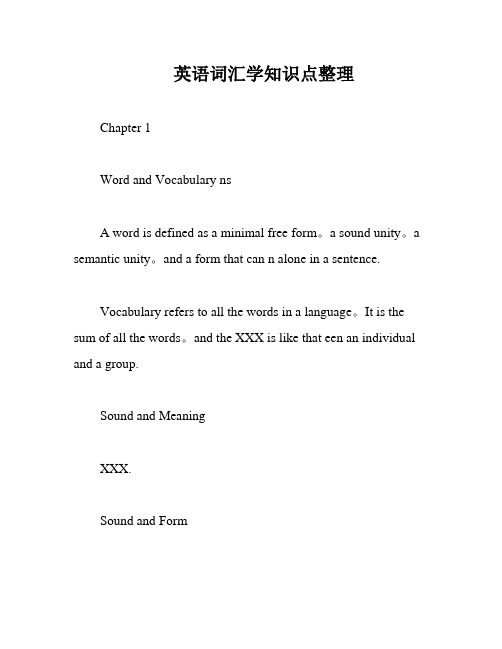
英语词汇学知识点整理Chapter 1Word and Vocabulary nsA word is defined as a minimal free form。
a sound unity。
a semantic unity。
and a form that can n alone in a sentence.Vocabulary refers to all the words in a language。
It is the sum of all the words。
and the XXX is like that een an individual and a group.Sound and MeaningXXX.Sound and FormThe written form of a natural language is the XXX een sound and form occur due to the n of the English alphabet from the Romans。
XXX。
the differences created by nal scribes。
and the continuing XXX.XXX languages。
such as Latin。
Greek。
French。
etc。
are known as borrowing or loanwords。
These words have been incorporated into the language over time and have e a part of the vocabulary.In terms of n。
words can be divided into basic words andnon-basic words。
Basic words are XXX to all speakers of the language。
- 1、下载文档前请自行甄别文档内容的完整性,平台不提供额外的编辑、内容补充、找答案等附加服务。
- 2、"仅部分预览"的文档,不可在线预览部分如存在完整性等问题,可反馈申请退款(可完整预览的文档不适用该条件!)。
- 3、如文档侵犯您的权益,请联系客服反馈,我们会尽快为您处理(人工客服工作时间:9:00-18:30)。
英语词汇知识资料
英语词汇知识资料
学习外语并不难,学习外语就像交朋友一样,朋友是越交越熟的,天天见面,朋友之间就亲密无间了。
重复重复再重复,熟练熟练再熟练,是学会英语的不二法门。
下面是给大家整理的一些英语词汇知识的学习资料,希望对大家有所帮助。
初一下册英语单词知识点
1. play chess 下国际象棋
2. play the guitar 弹吉他
3. speak English 说英语
4. English club 英语俱乐部
5. talk to 跟…说
6. play the violin 拉小提琴
7. play the piano 弹钢琴8. play the drums 敲鼓9. make friends 结交朋友
10. do kung fu 练(中国) 功夫11. tell stories 讲故事12. play games 做游戏
13. on the weekend/on weekends 在周末
◆用法集萃1. play +棋类/球类下……棋,打……球2. play the +西洋乐器弹/拉……乐器3. be good atdoing sth.= do well in doing sth. 擅长做某事4. be good with sb. 和某人相处地好5. need sb.to do sth. 需要某人做某事6. can + 动词原形能/会做某事7. a little + 不可数名词一点儿…… 8. join the…club 加入…俱乐部9. like to do sth. =love to do sth. 喜
欢/喜爱做某事◆典句必背
1. Can you draw? Yes, I can. / No, I can’t.
2. What club do you want to join? I want to join the chess club.
3. You can join the English club.
4. Sounds good./That sounds good.
5. I can speak English and I can also play soccer.
6. Please call Mrs. Miller at 555-3721.
◆话题写作
Dear Sir,
I want to join your organization (组织) to help kids with sports, music andEnglish. My name is Mike. I am 15 years old. I’m a student in No. 1 Middleschool. I can play the guitar well. I can sing many songs. I can swim and speakEnglish well, too. I think I can be good with the kids. I also do well intelling stories.
I hope to get your letter soon.
Yours,
Mike
英语作文高级词汇
1.occur 替换think of
Suddenly I had an idea that someone had broken into
my house. →
An idea occurred to me that someone had broken into my house.
It occurred to me that someone had broken into my house.
2.devote替换spend
He spends all his spare time in reading. →
He devotes all his spare time to reading.
3.seek替换want / look for
They sought ( wanted ) to hide themselves behind the trees.
4.average 替换ordinary
I’m an average ( ordinary ) student.
5.but替换very
The film we saw last night was very interesting. →
The film we saw last night was nothing but interesting.
The film we saw last night was anything but boring.
6.seat 替换sit
On his way to school, he found an old lady seated (sitting) by the road,looking worried.
7.suppose 替换should
He is supposed to ( should ) have driven more slowly.。
